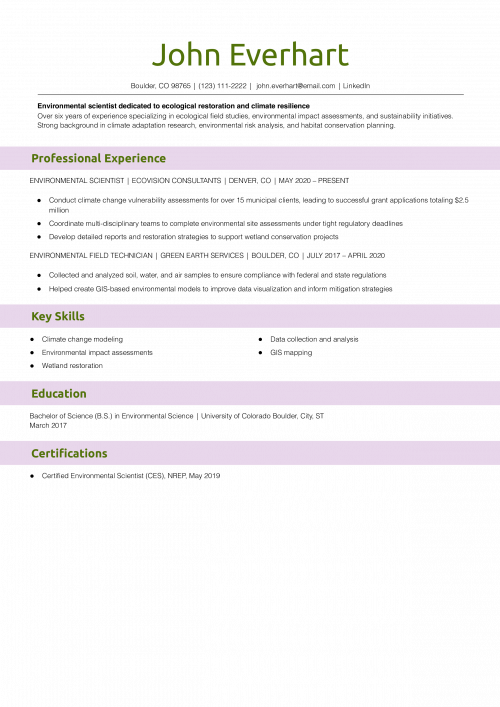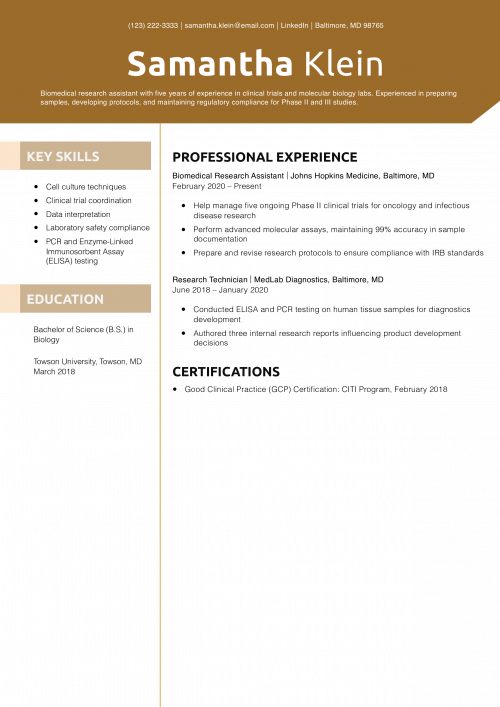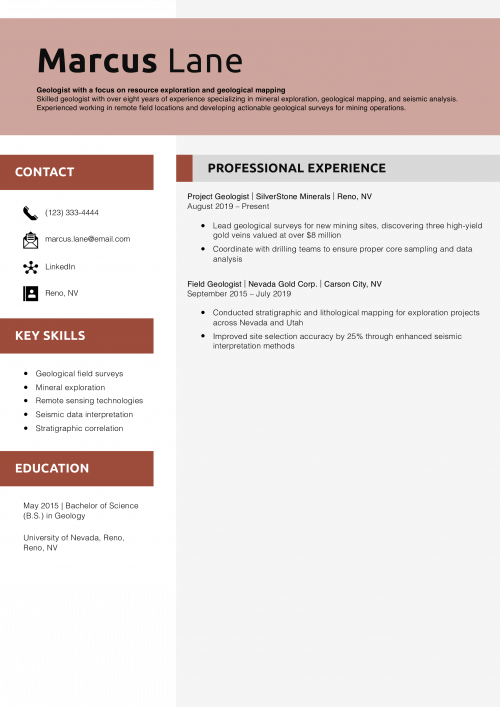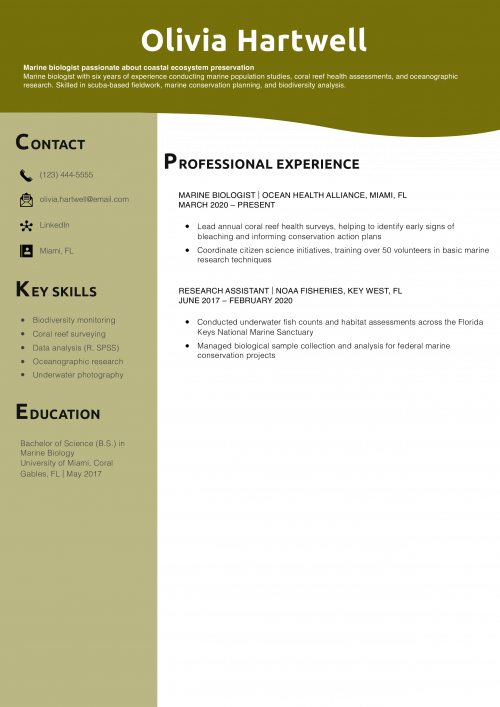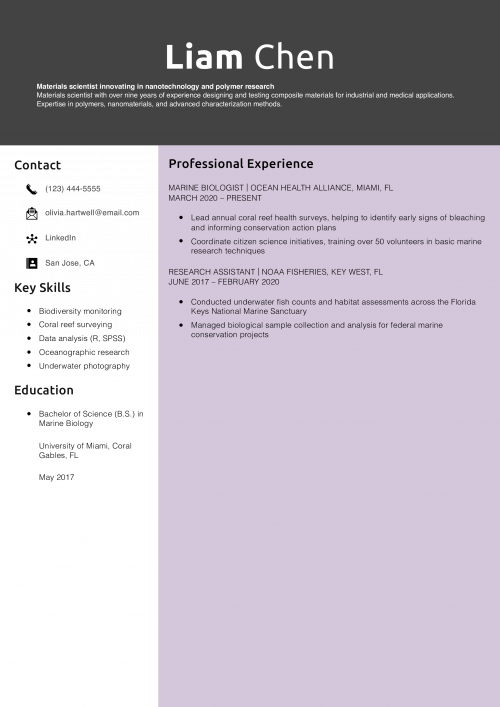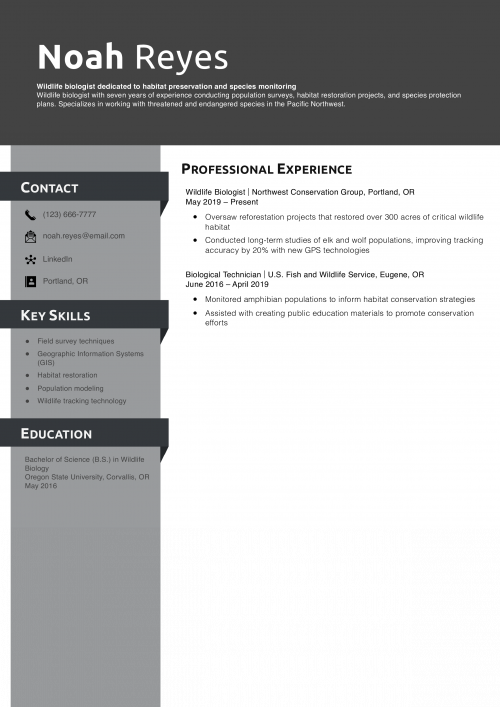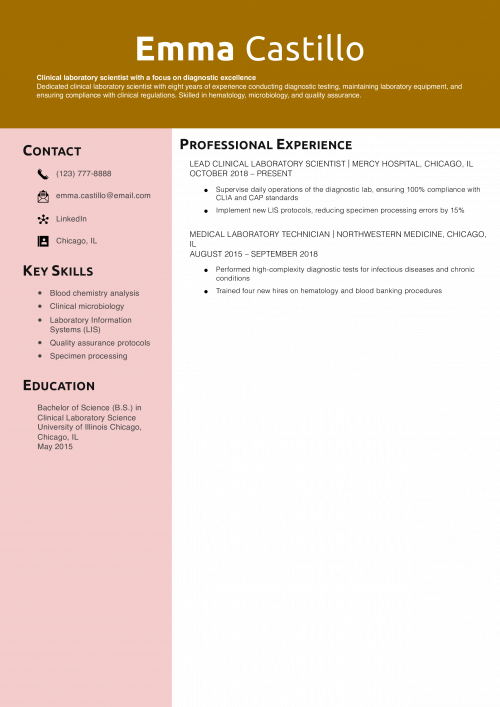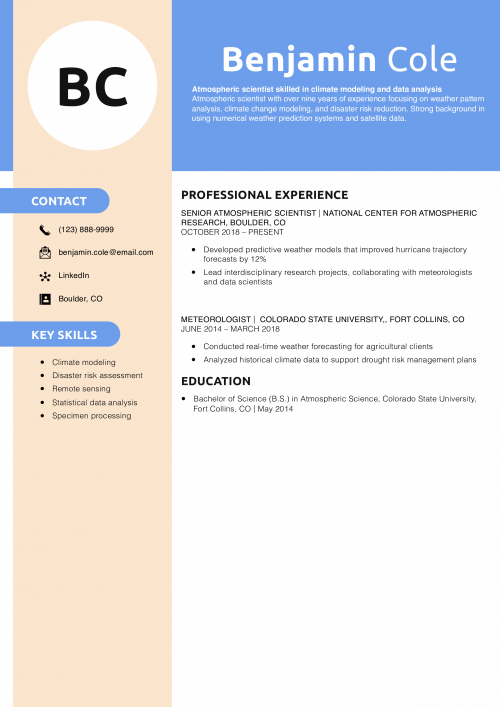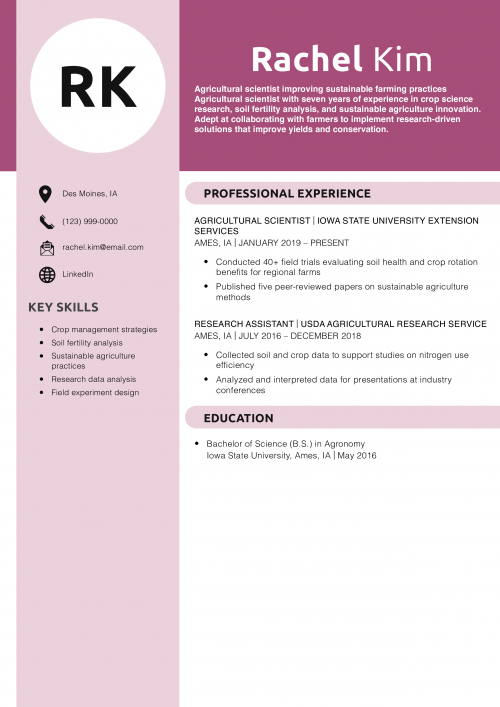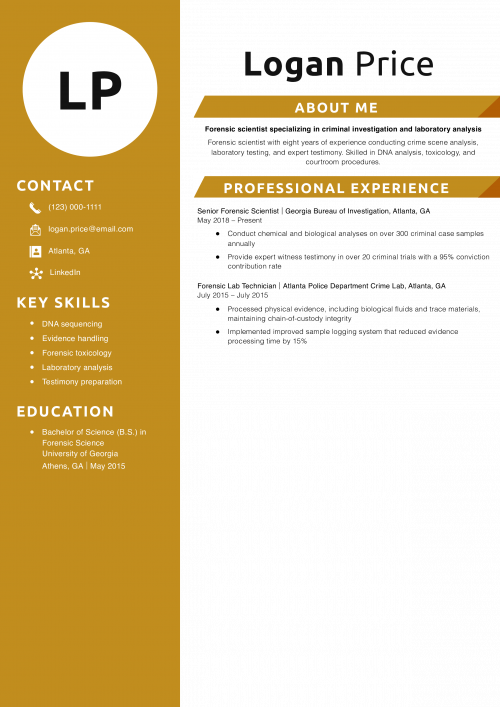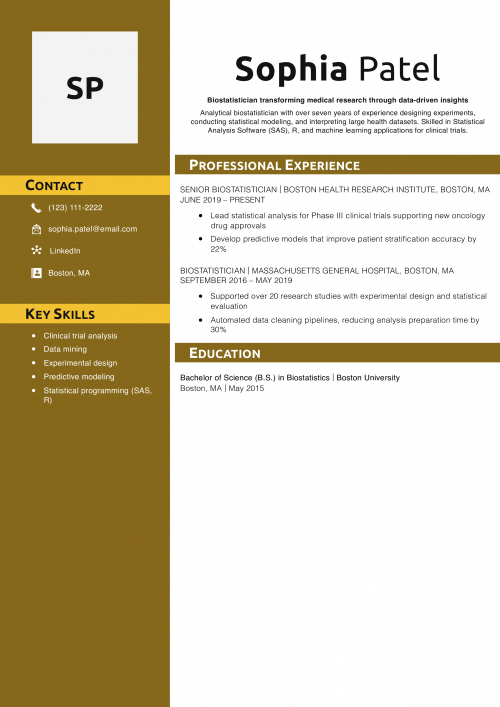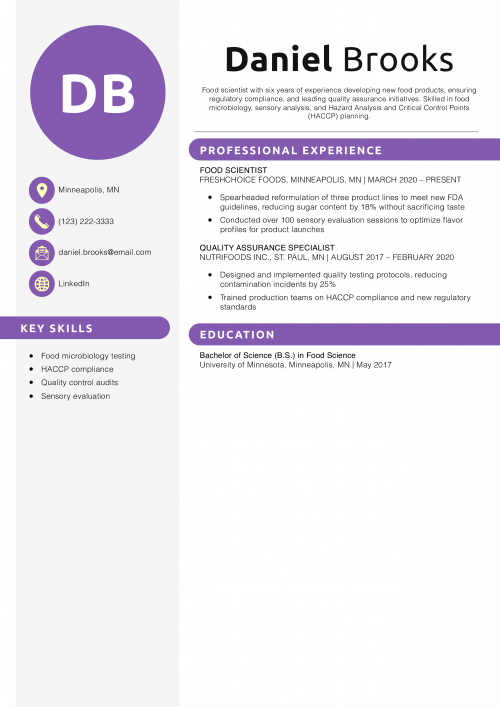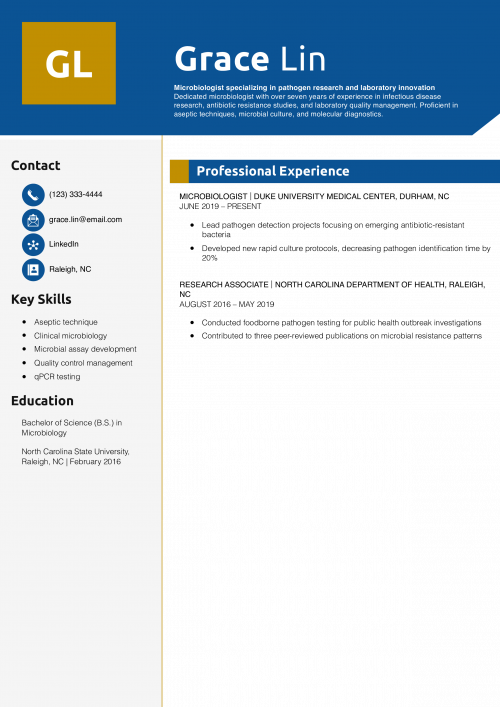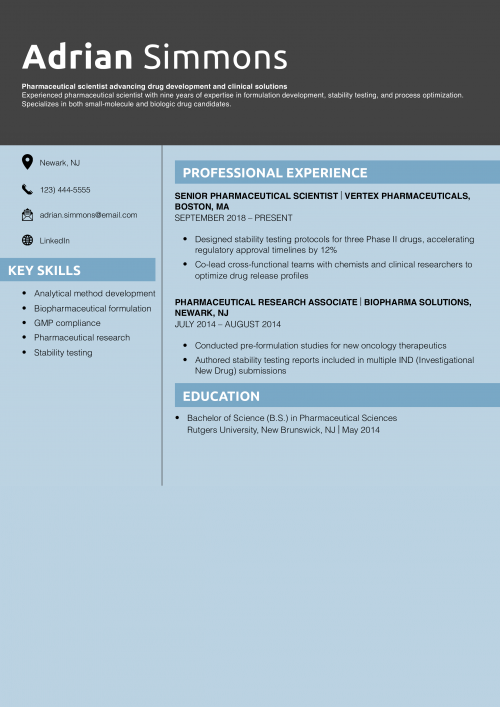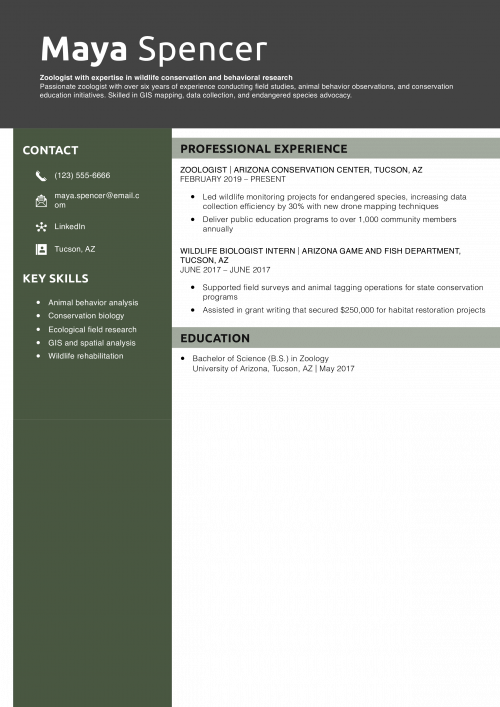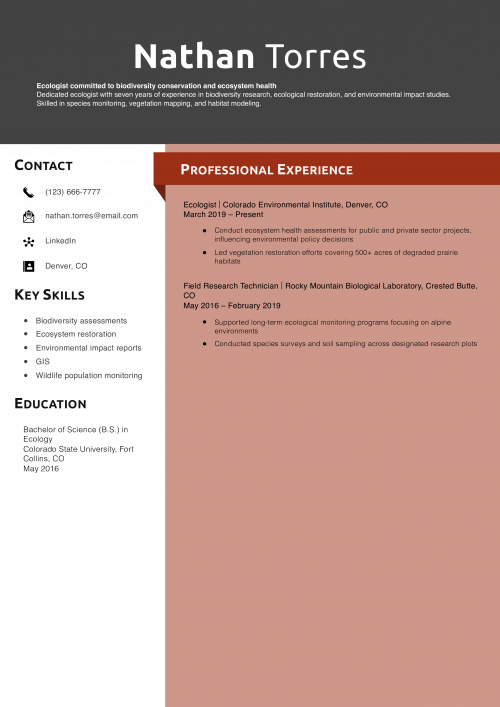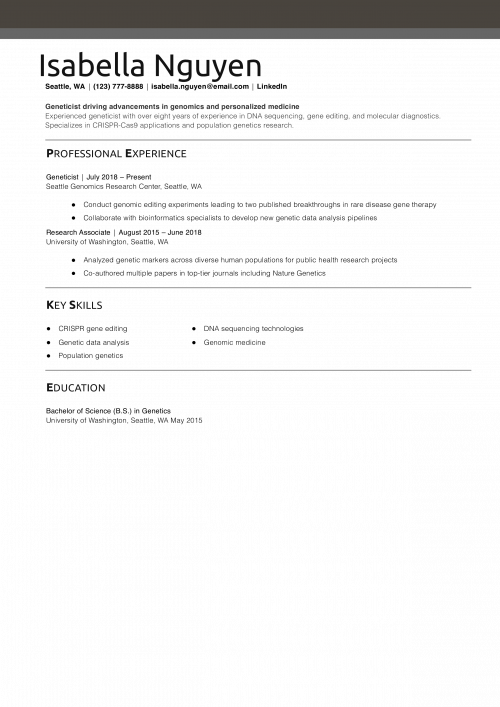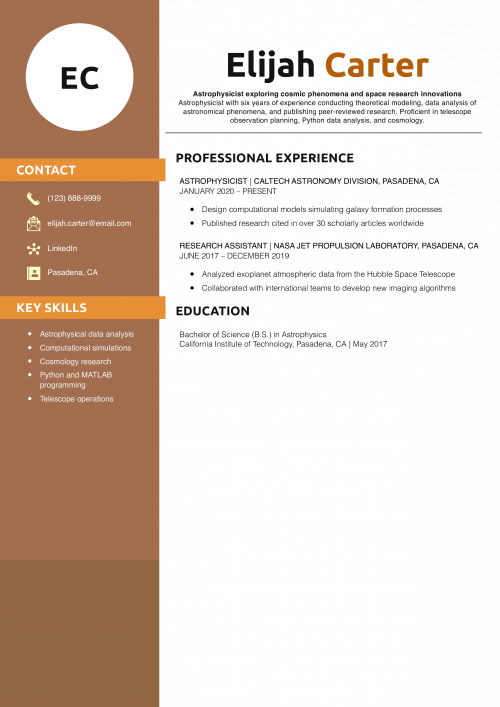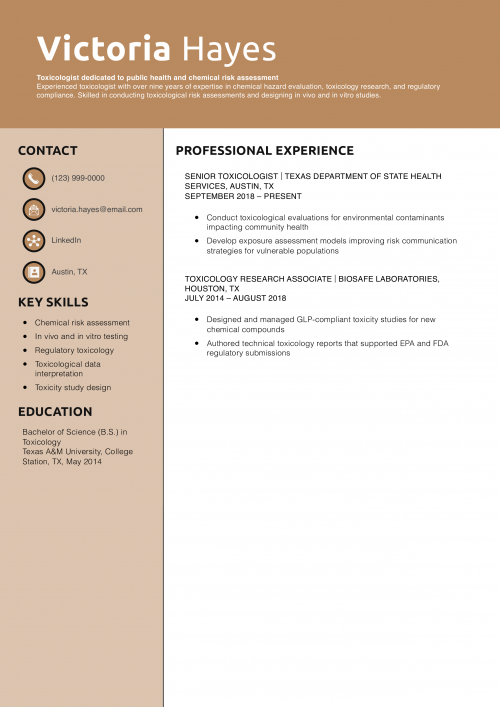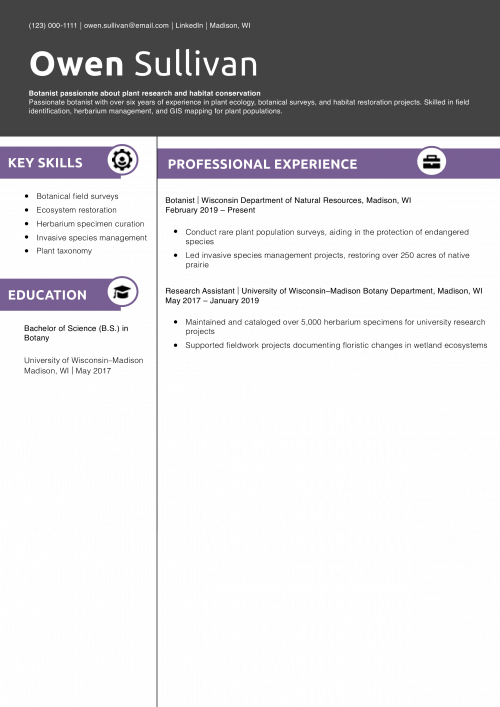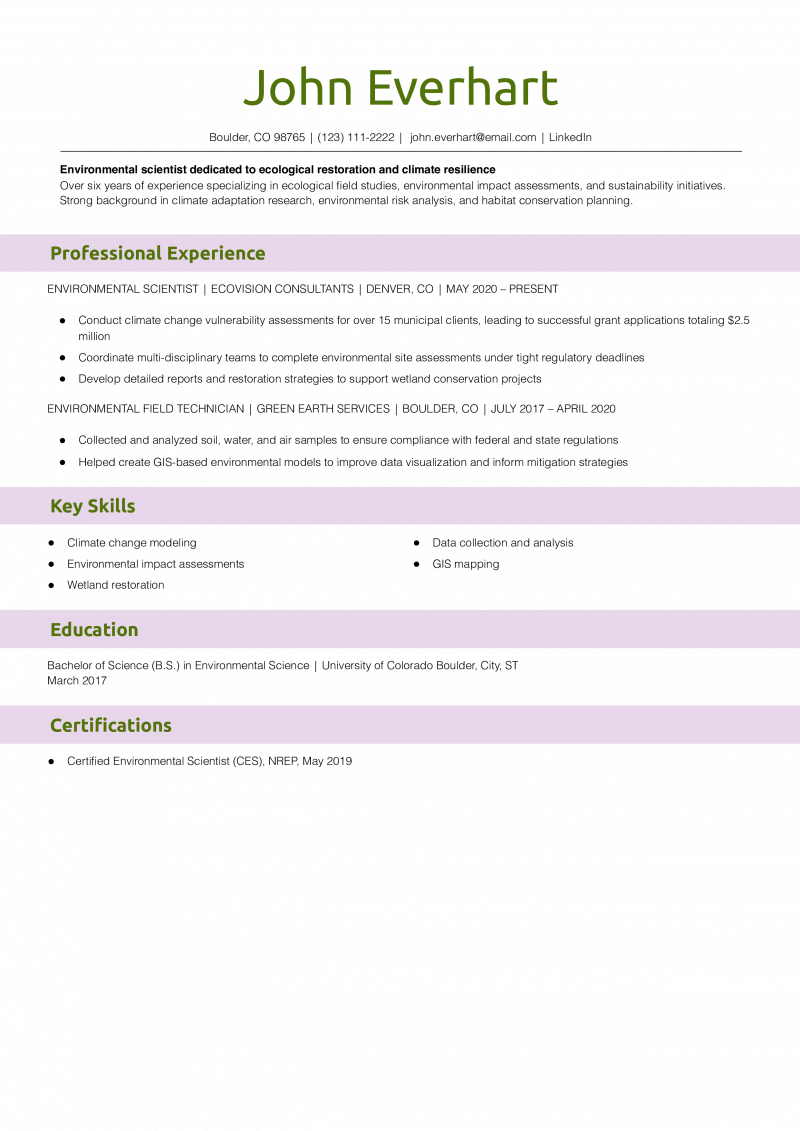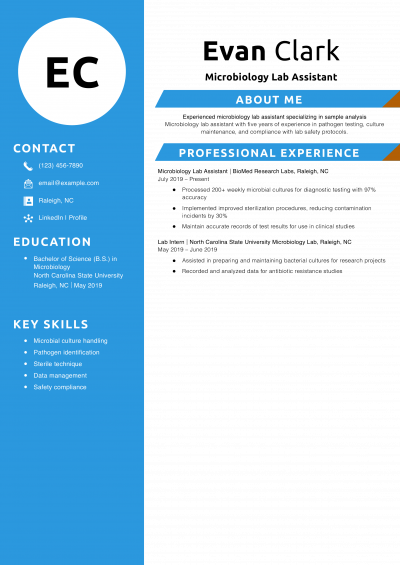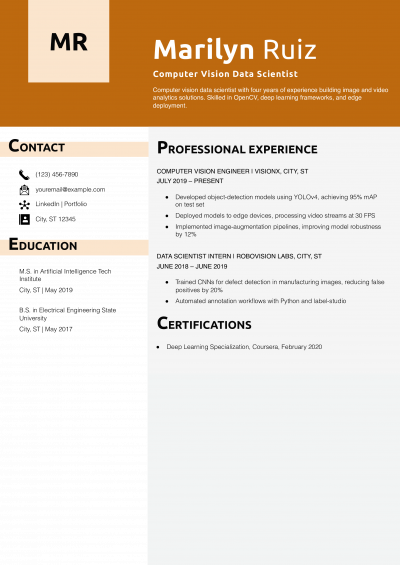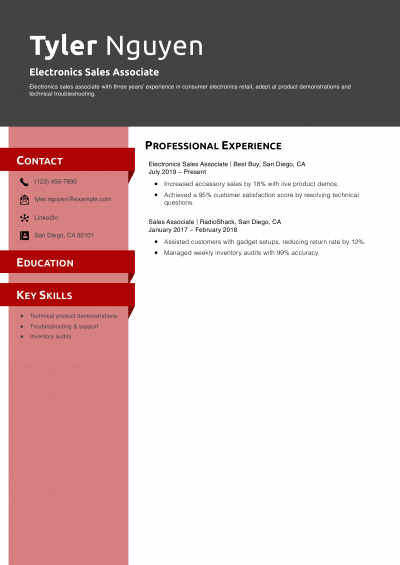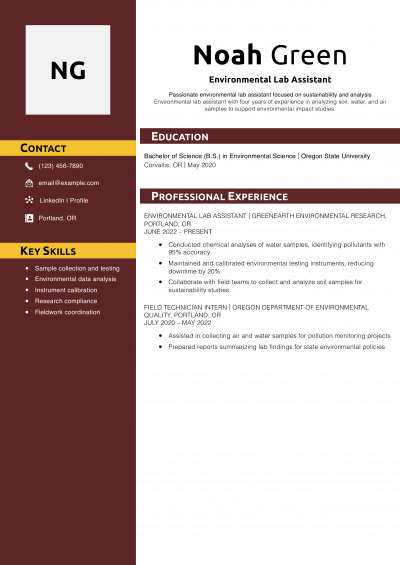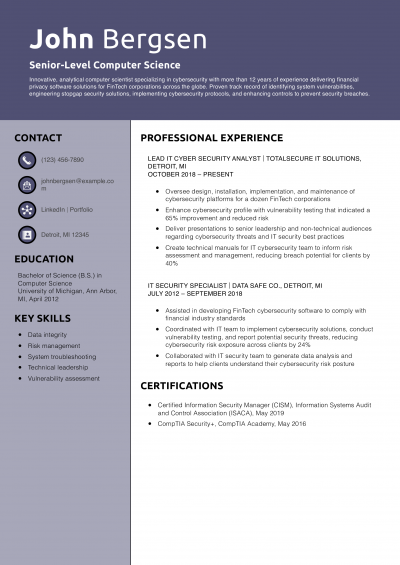A good science resume focuses on your skills and expertise in areas like data analysis, experimental design, or lab procedure development. Give examples of your success in similar roles, and show your knowledge base by citing any degree or certificate programs you’ve done. This guide provides expert tips to help you create a persuasive resume showing your best science skills.
Key takeaways:
- Brainstorm details about your work history on a separate document or blank sheet of paper. Then, identify the most relevant ones to feature in your experience section – this helps you give your resume the right focus.
- Spell out the positive impact of your work. Describe how your research helped organizations or added to important bodies of knowledge.
- Follow the combination resume format to provide all required information while positioning yourself for science jobs that interest you.
“Science resumes should emphasize accuracy and structure. A well-organized format allows employers to easily review research experience, technical skills, and areas of specialization.” — Andrew Stoner, Executive Resume Writer and Career Coach
Science Resume Templates and Examples (Download in App)
Environmental Scientist Resume Example
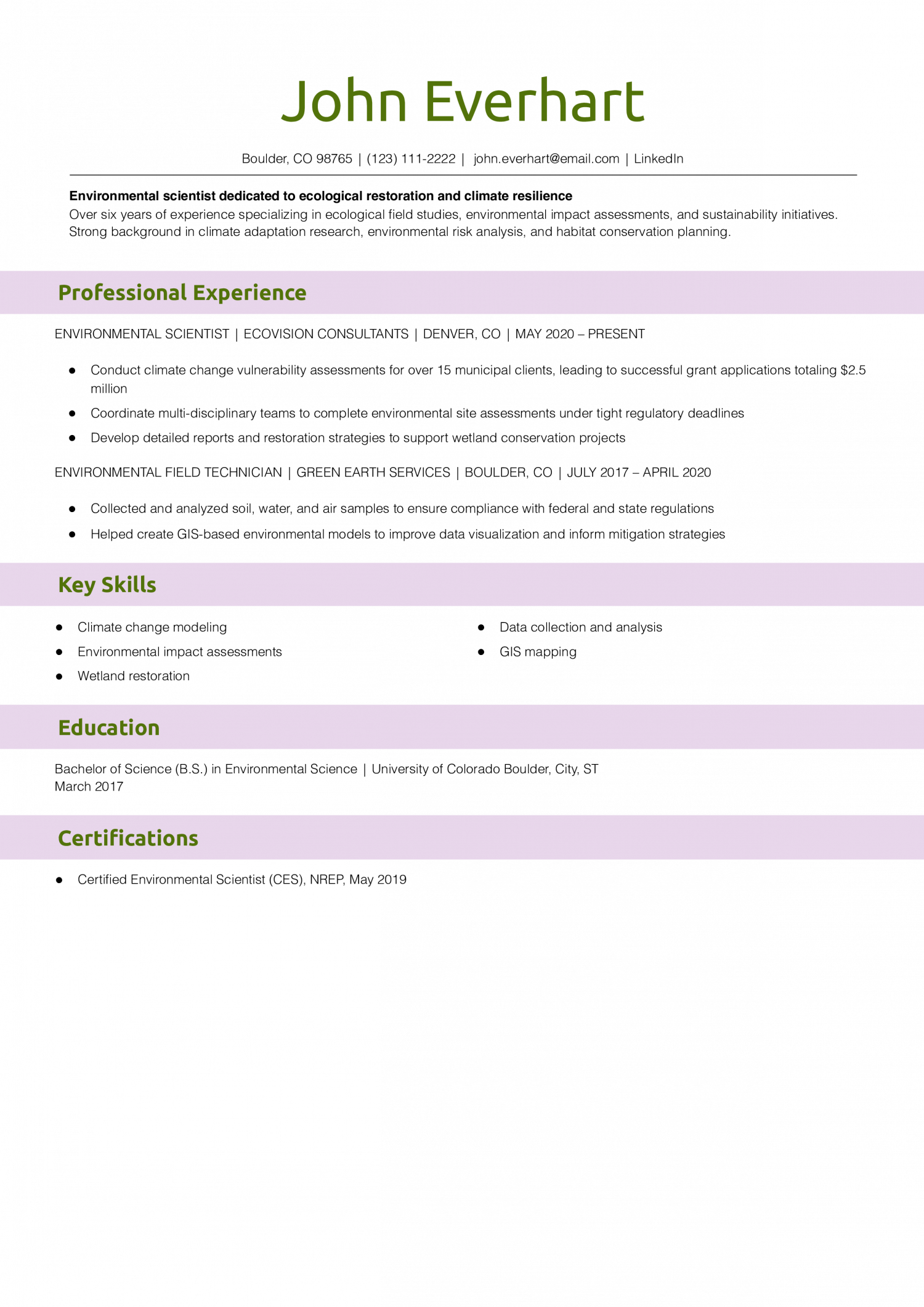
Why this environmental scientist resume example is strong:
This resume effectively highlights technical strengths like GIS and data analysis and demonstrates measurable impacts such as grant success and conservation planning. It stays tightly focused on field-specific accomplishments.
Key Tip:
Use strong metrics to show your value, like grant money earned or a number of assessments completed. Find more advice at How To Make a Resume.
Biomedical Research Assistant Resume Example
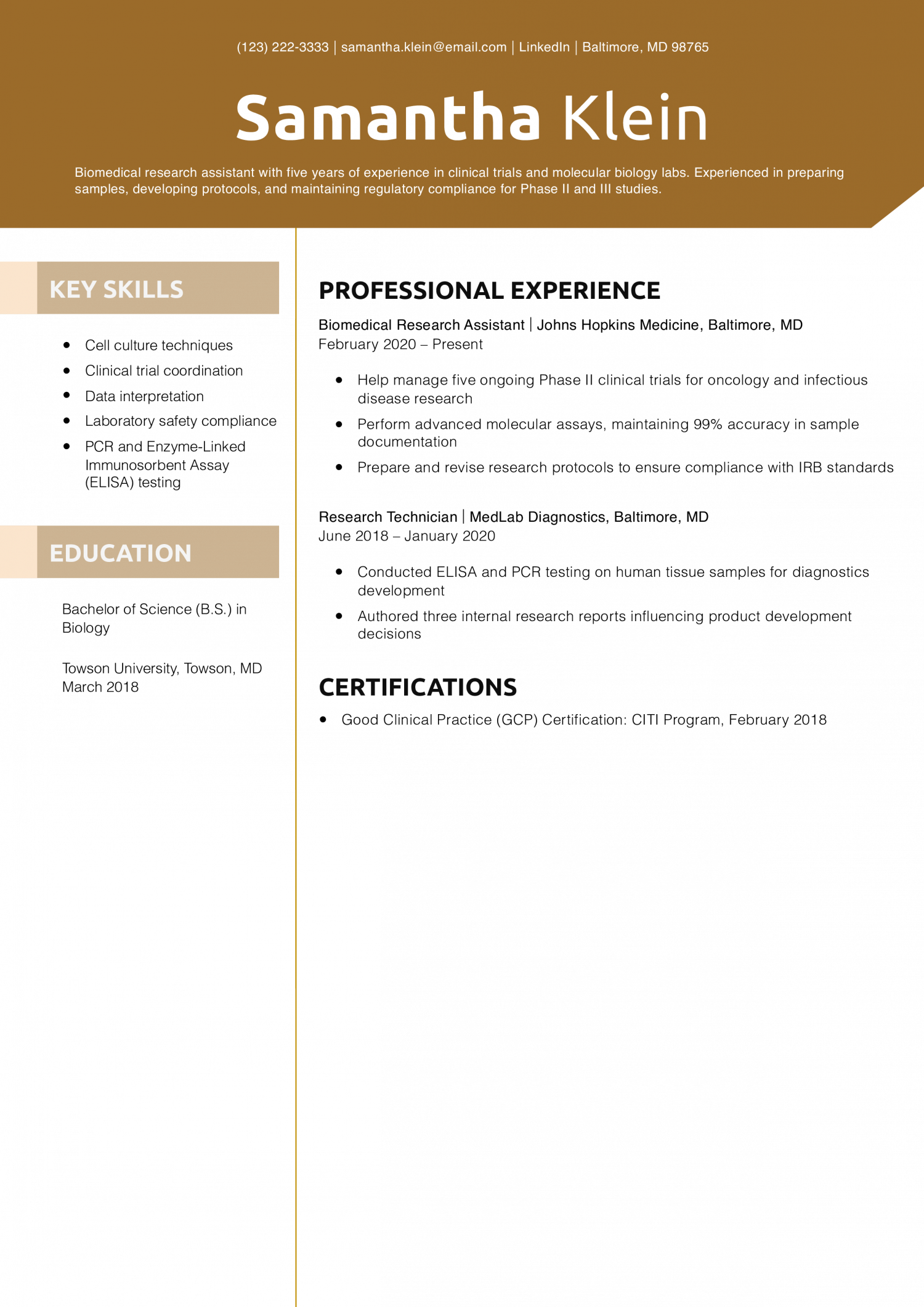
Why this biomedical research assistant resume example is strong:
Samantha’s resume showcases her technical proficiency and highlights compliance with clinical and research standards, critical for lab-based science roles.
Key Tip:
Demonstrating regulatory knowledge can make a big difference in lab careers. Read more tips at Skills To Put on Resume.
Geologist Resume Example
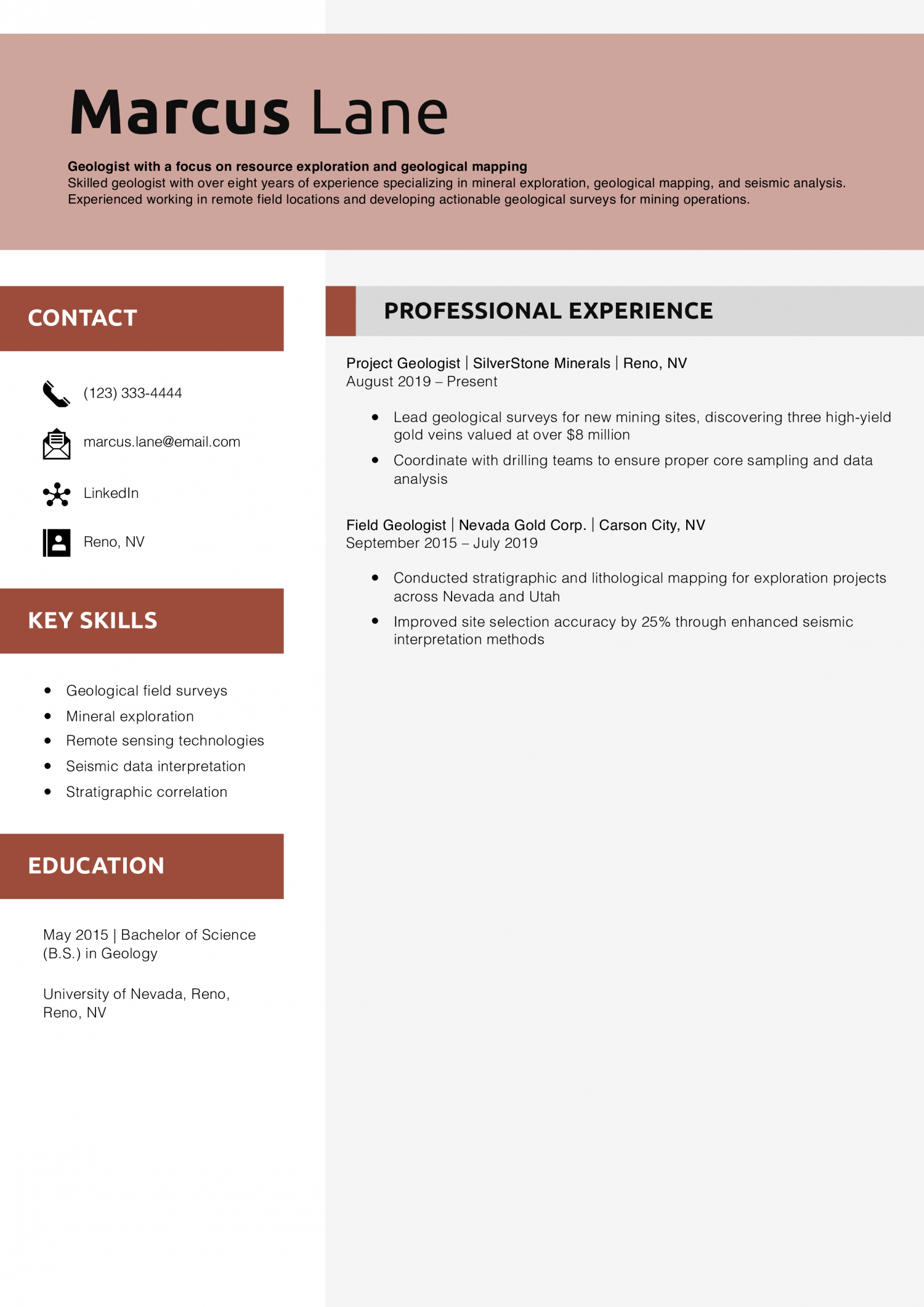
Why this geologist resume example is strong:
Marcus’s resume highlights fieldwork success and financial impacts from his discoveries, providing tangible proof of his effectiveness.
Key Tip:
Use the right structure to prioritize your most valuable experience. See how at Best Resume Formats.
Marine Biologist Resume Example
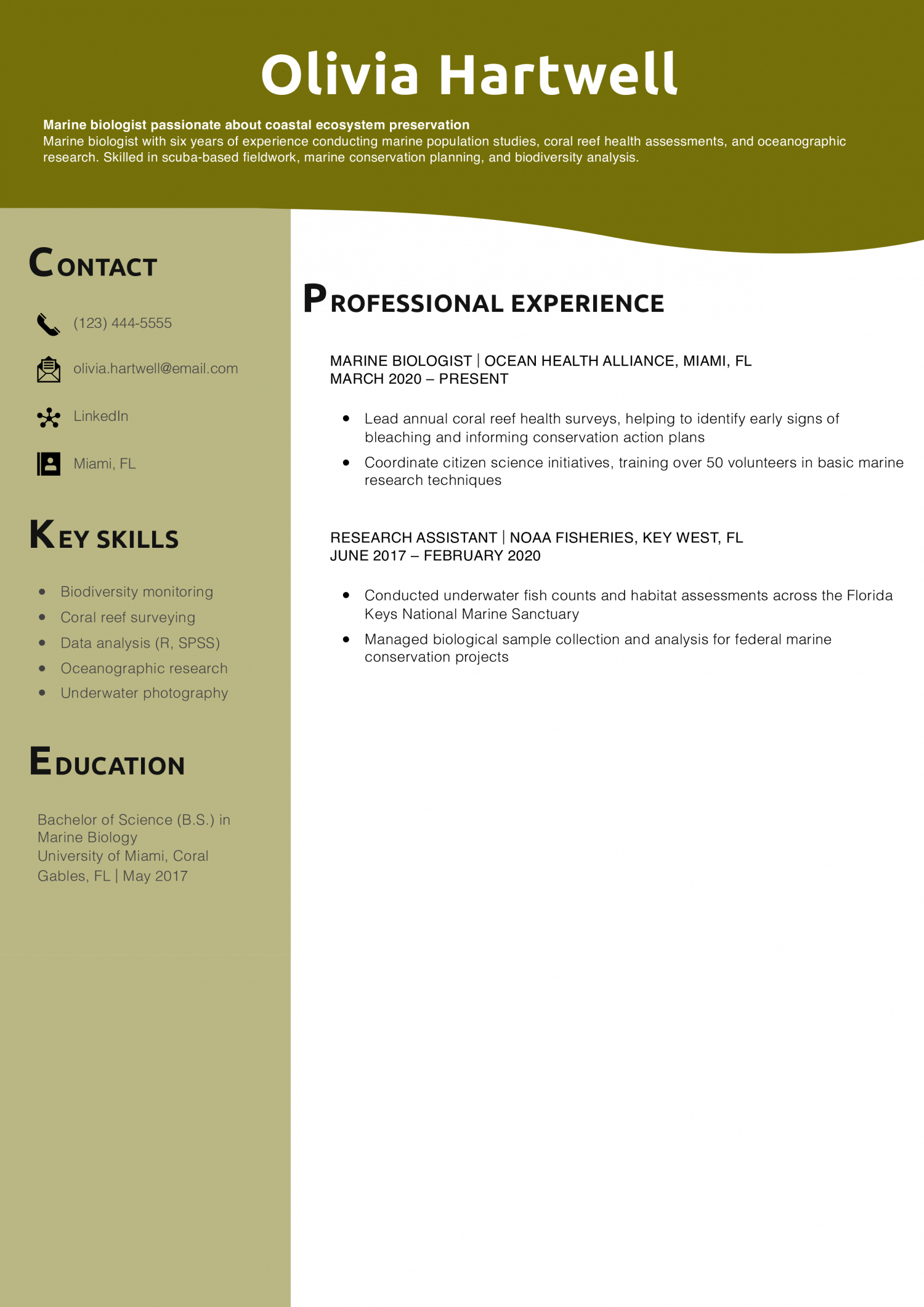
Why this marine biologist resume example is strong:
Olivia’s resume balances field expertise with leadership in volunteer-based programs, showing technical strength and teamwork.
Key Tip:
Include leadership experience even if it’s informal. Learn more at Resume Objective Examples.
Materials Scientist Resume Example
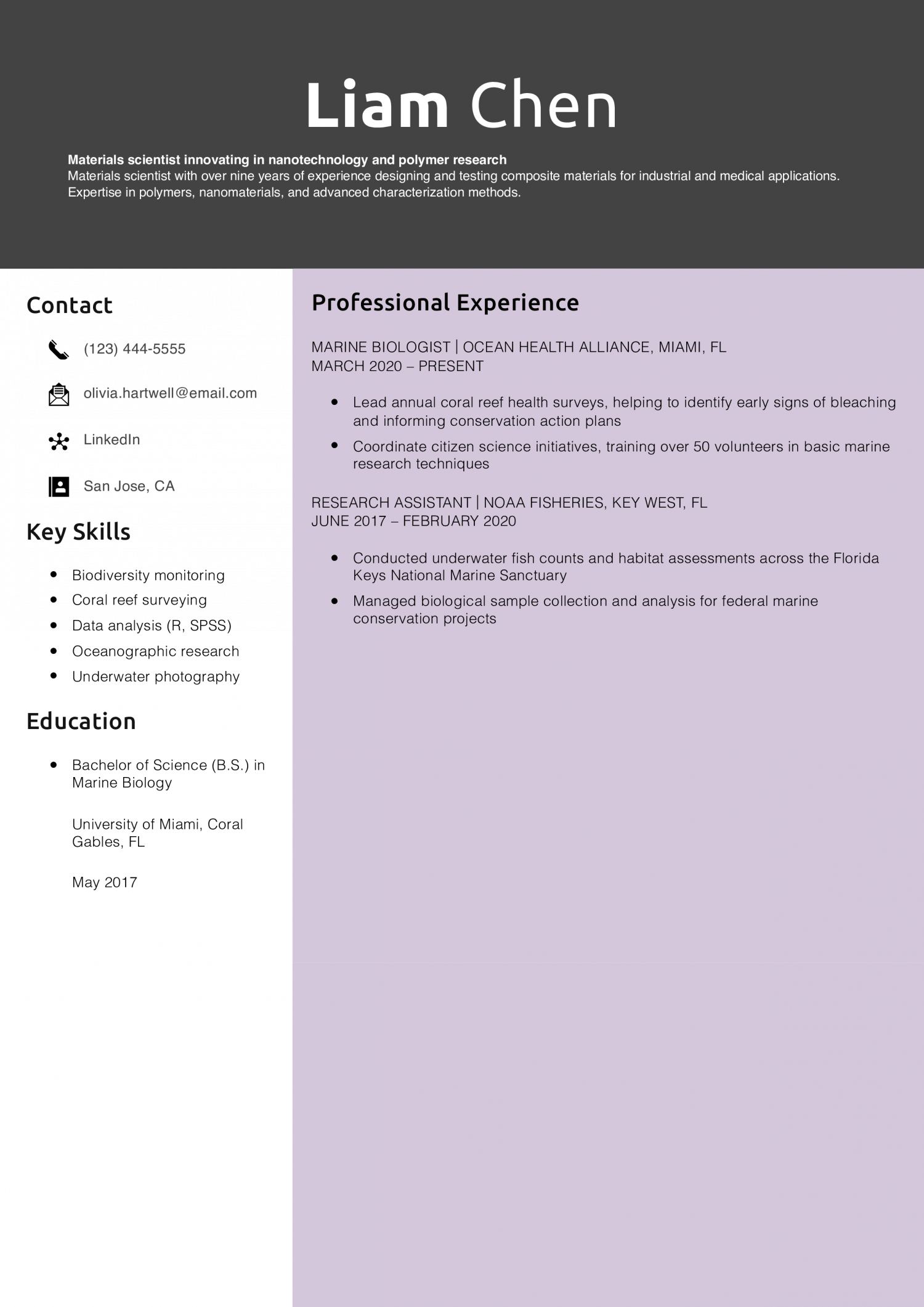
Why this materials scientist resume example is strong:
Liam highlights specific innovations and patents, showcasing a clear record of advancement and real-world applications.
Key Tip:
Show innovation impact clearly and link it to business results. More strategies at How To Write a Resume Summary.
Wildlife Biologist Resume Example
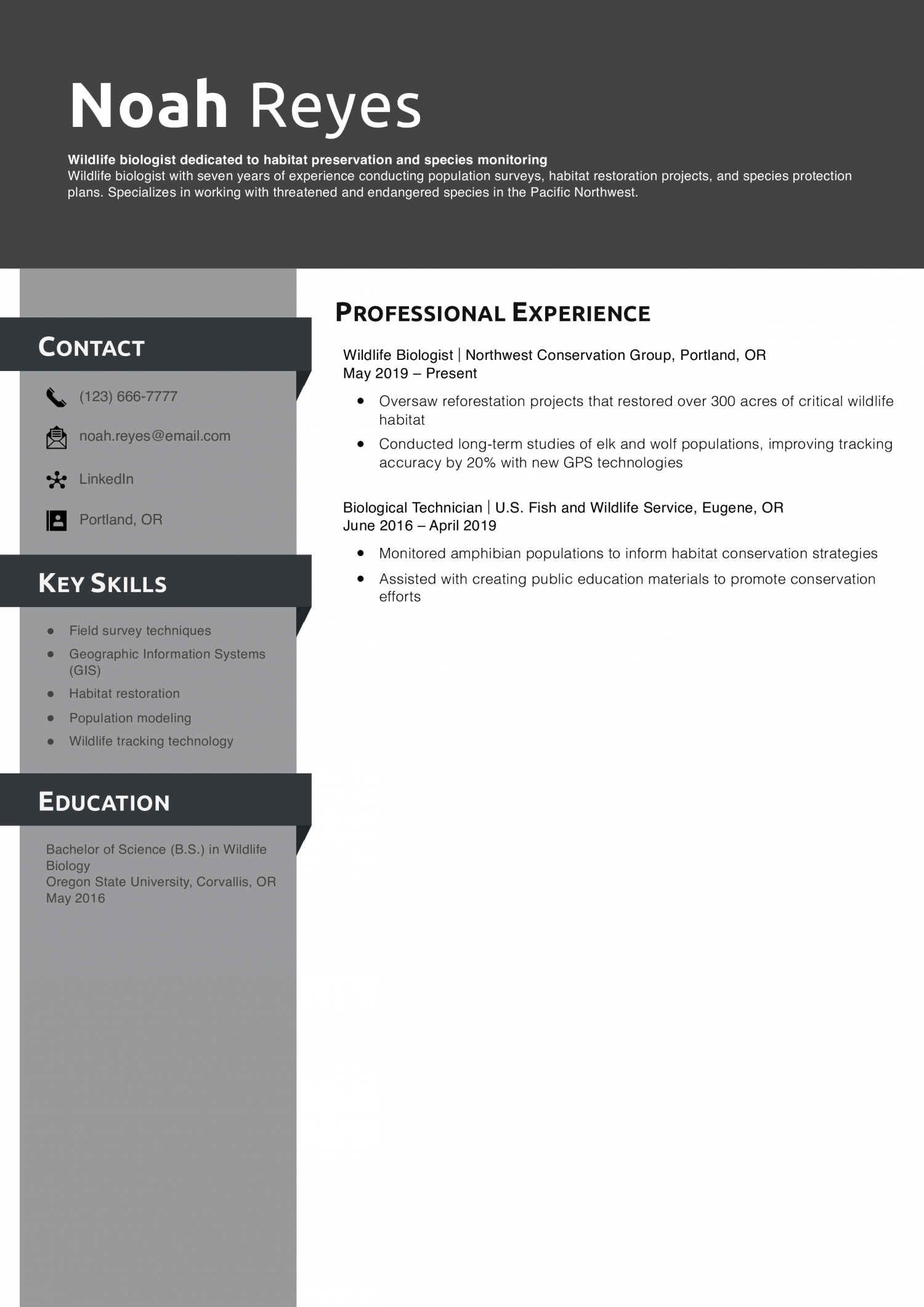
Why this wildlife biologist resume example is strong:
Noah’s resume draws attention to conservation outcomes and effective use of technology, blending fieldwork expertise with technical adaptability.
Key Tip:
Highlight both scientific and outreach experience if applicable. Find more ideas at What Hobbies To Put on Resume.
Clinical Laboratory Scientist Resume Example
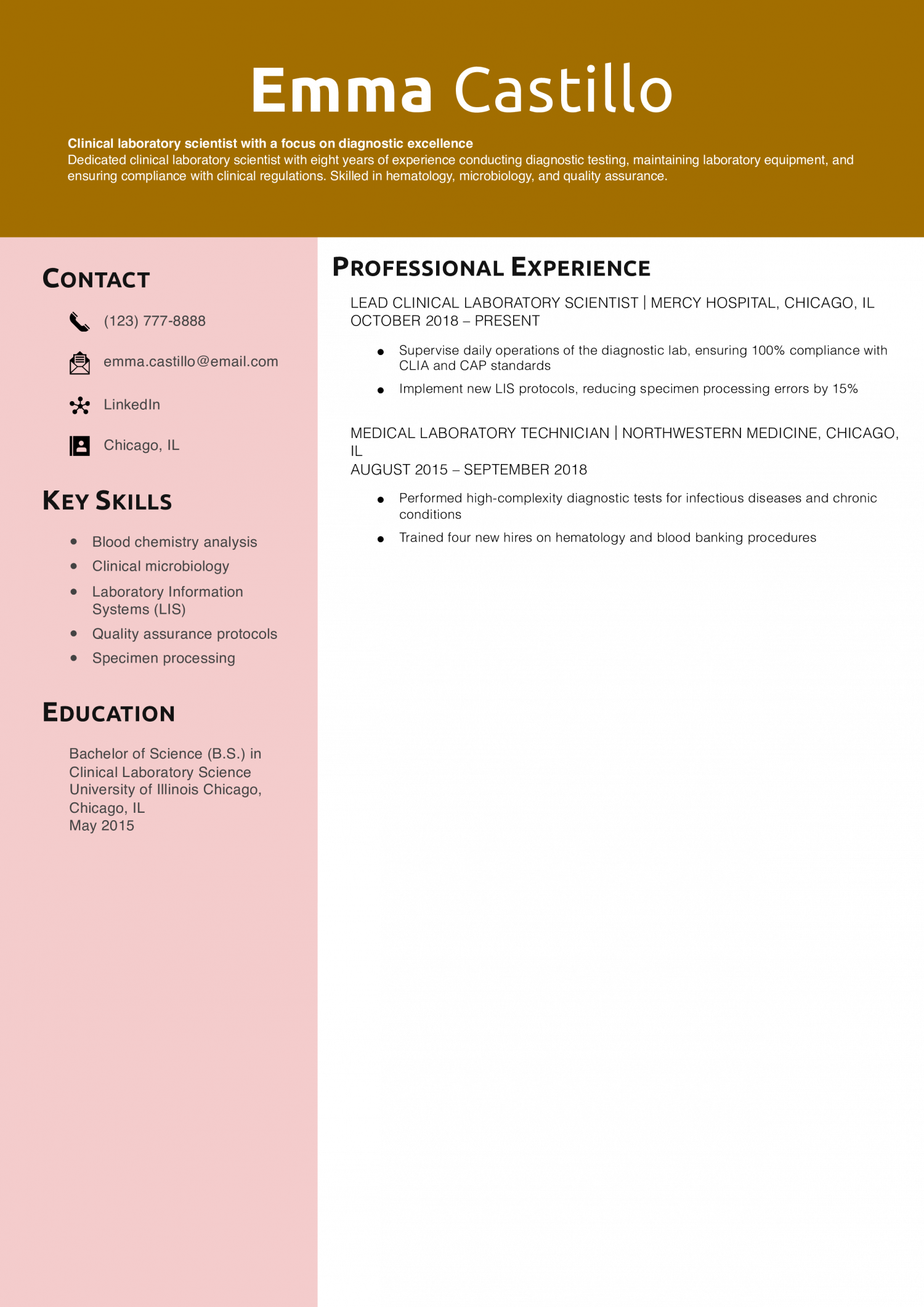
Why this clinical laboratory scientist resume example is strong:
Emma’s resume shows career progression into leadership roles and highlights regulatory knowledge critical to lab environments.
Key Tip:
Highlight certifications, procedures, and compliance standards clearly. Get more ideas at How To List Education on a Resume.
Atmospheric Scientist Resume Example
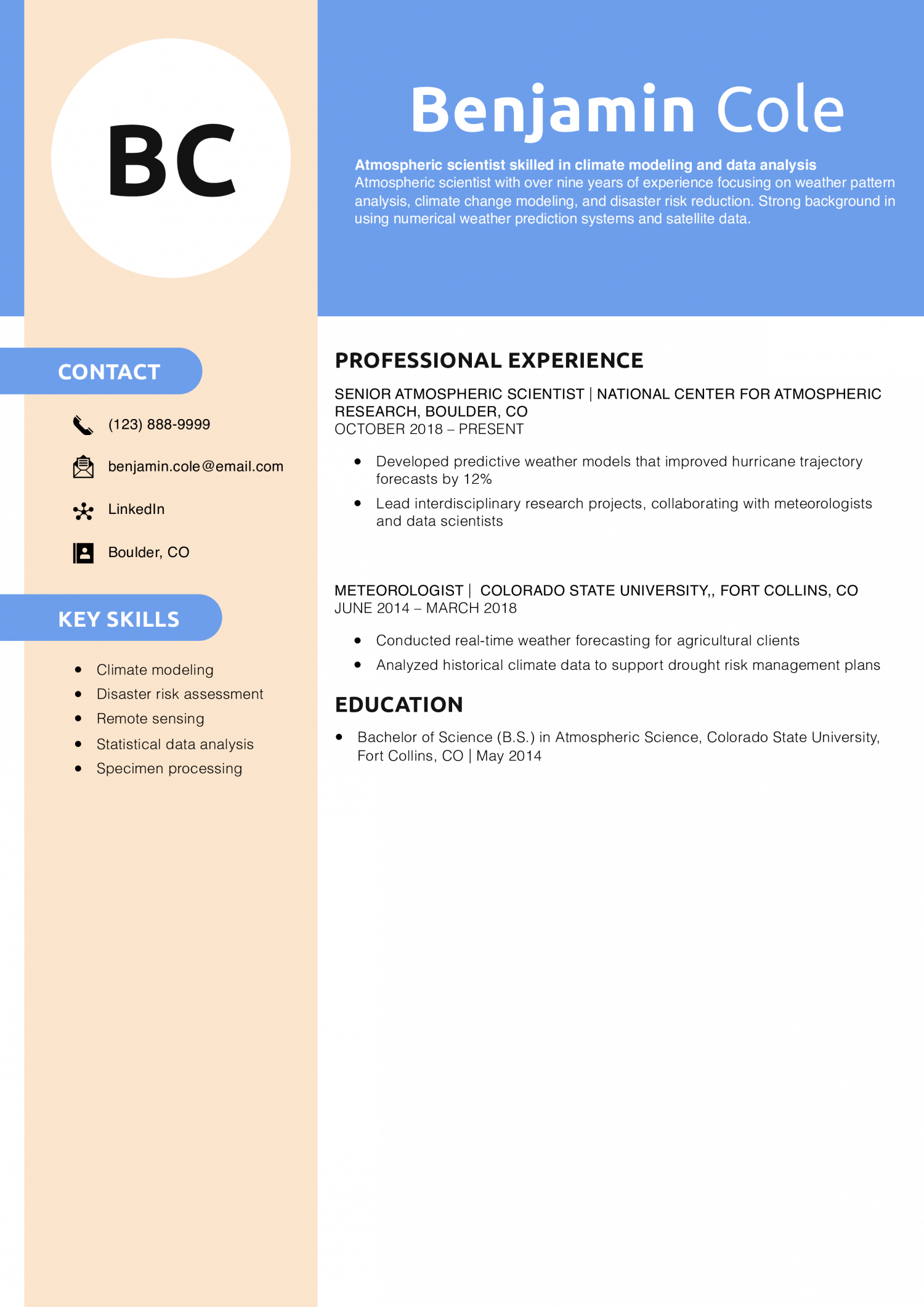
Why this atmospheric scientist resume example is strong:
Benjamin’s resume emphasizes specialized forecasting skills and leadership in multi-disciplinary projects.
Key Tip:
When showing scientific research experience, focus on outcomes and collaboration. Find more tips at How Far Back Should a Resume Go?
Agricultural Scientist Resume Example
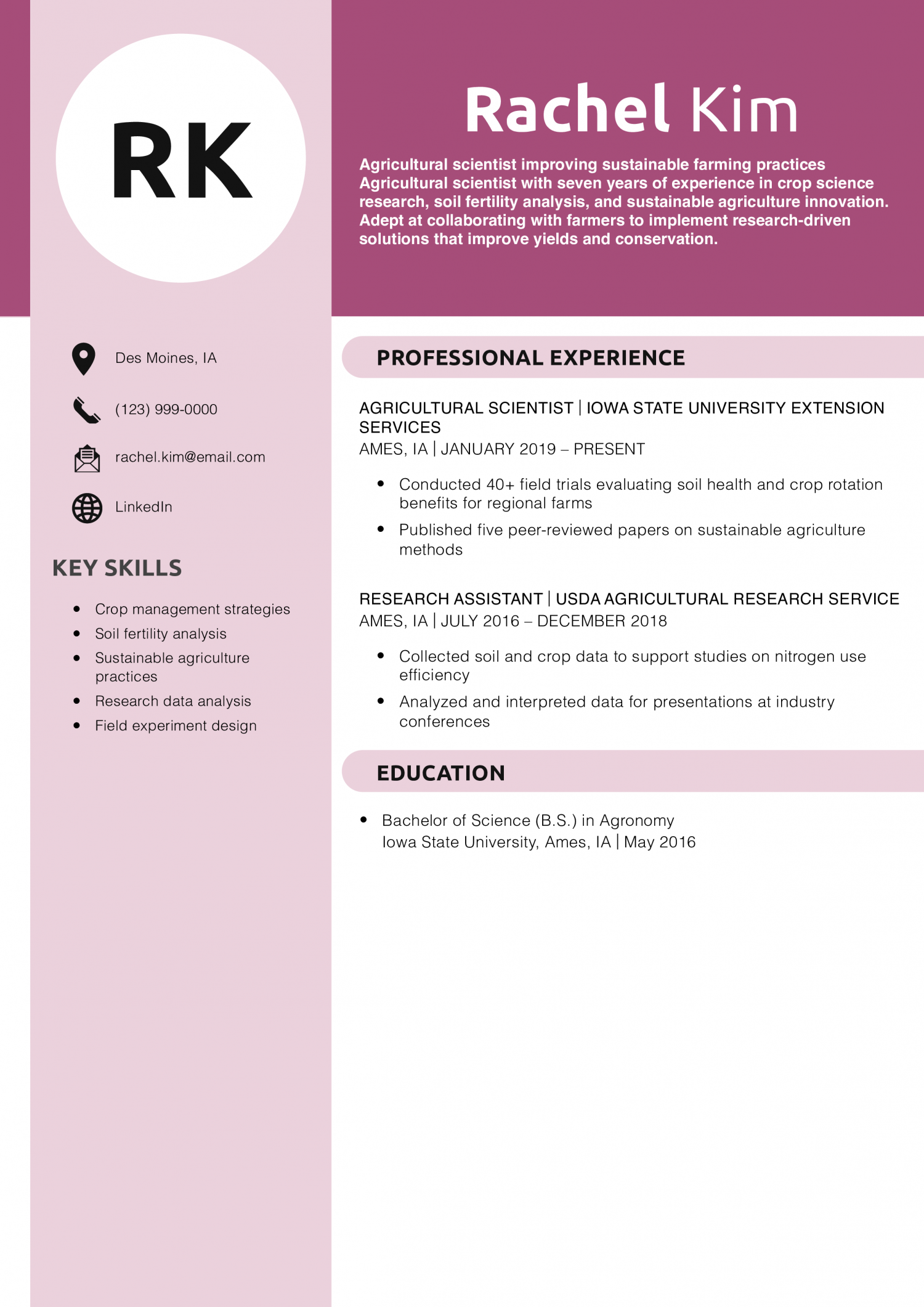
Why this agricultural scientist resume example is strong:
Rachel’s resume demonstrates hands-on research experience and strong publication history, essential in agricultural science careers.
Key Tip:
Always emphasize publications, conference presentations, or fieldwork results when applying for scientific roles. See more at What To Put on a Resume.
Forensic Scientist Resume Example
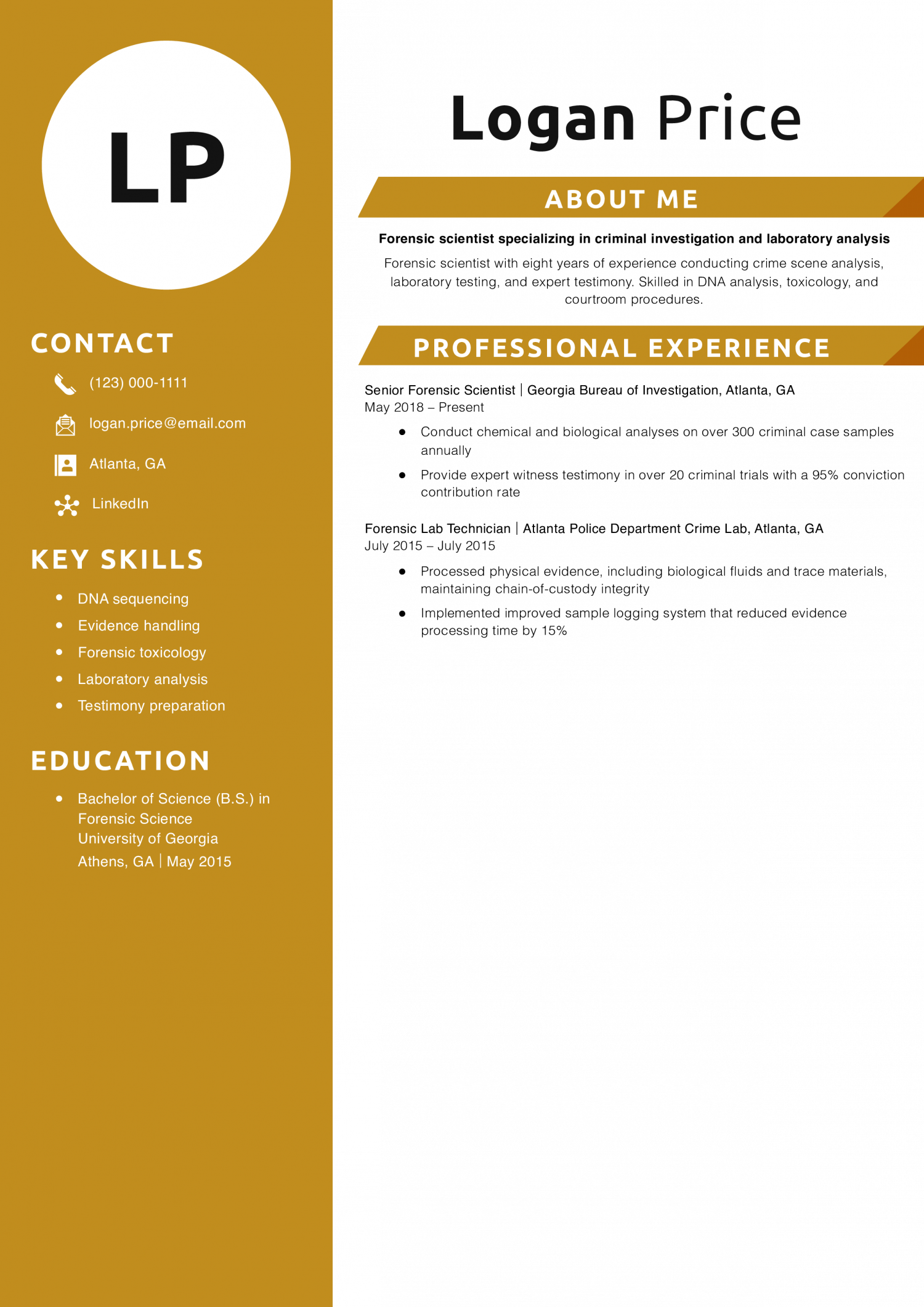
Why this forensic scientist resume example is strong:
Logan’s resume stands out by showcasing measurable casework contributions and emphasizing courtroom experience, crucial for forensic roles.
Key Tip:
Highlight courtroom testimony and real-world impact when possible. Learn how to sharpen your resume at CV Vs. Resume: What Is the Difference?
Biostatistician Resume Example
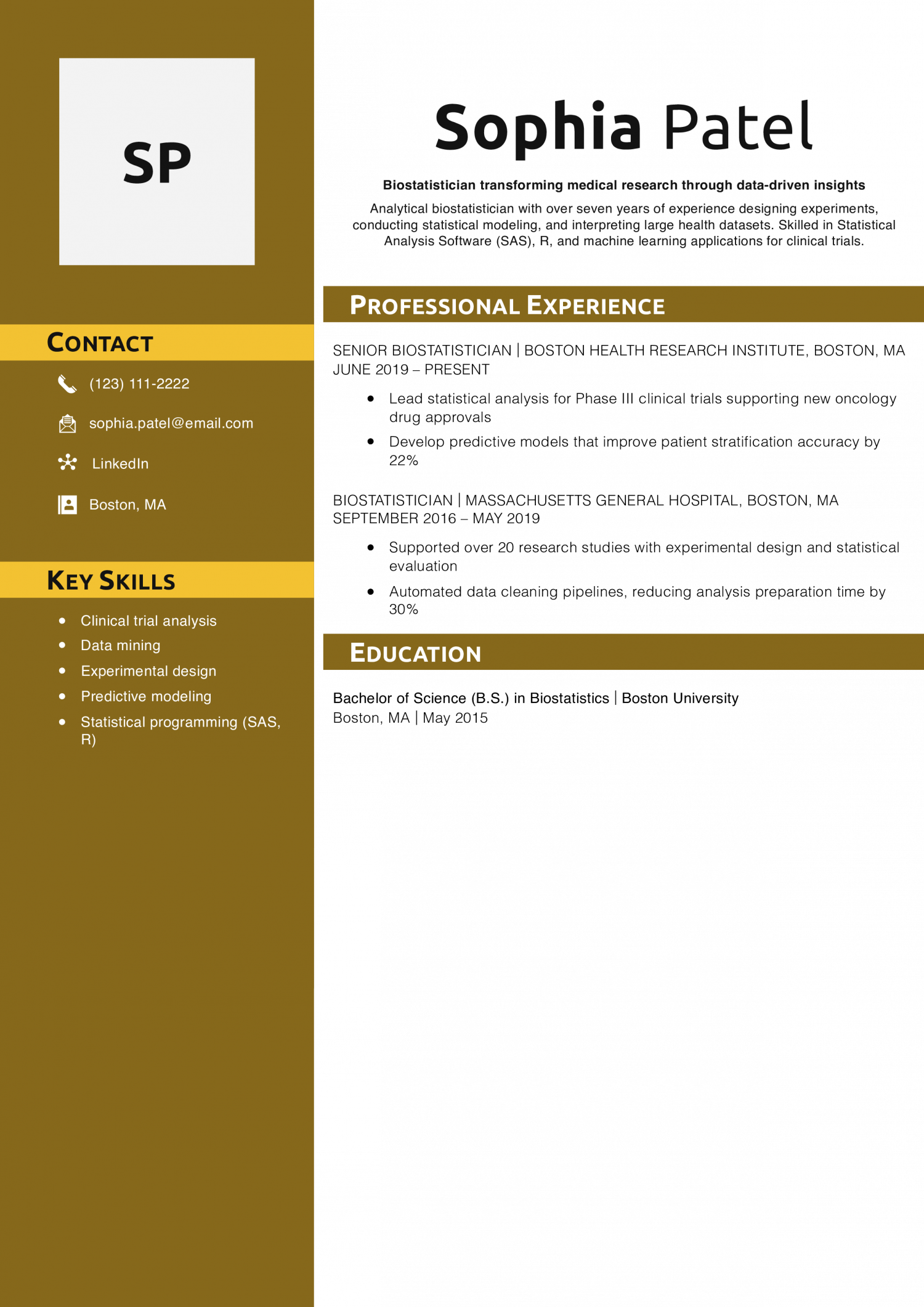
Why this biostatistician resume example is strong:
Sophia’s resume highlights her direct contributions to clinical trial successes and technical leadership in data pipeline optimization.
Key Tip:
Showcase not only the tools you use but how they impacted research outcomes. Read more tips at How To Write a Resume With No Experience.
Food Scientist Resume Example
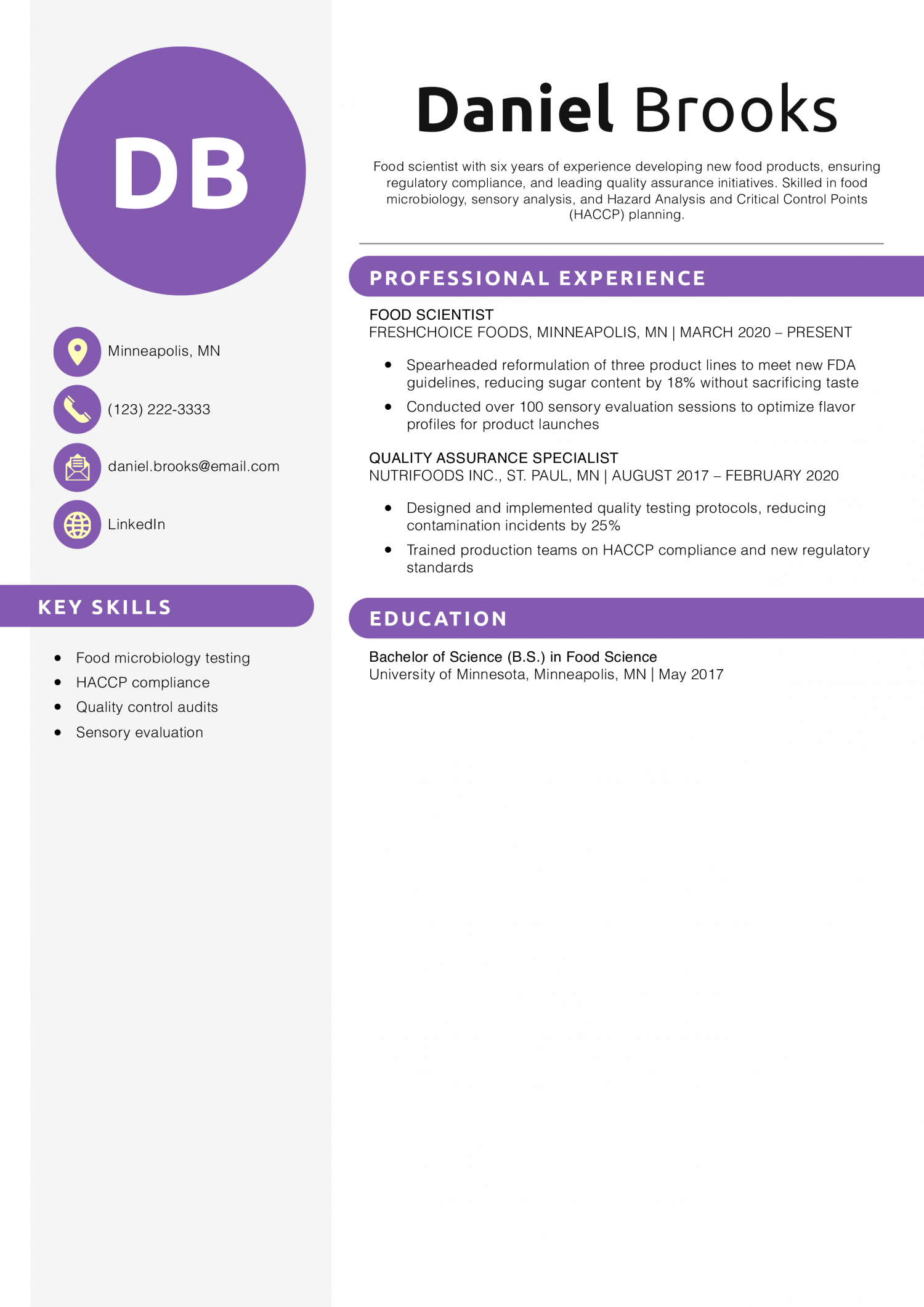
Why this food scientist resume example is strong:
Daniel’s resume highlights both innovation in product development and excellence in regulatory compliance, showing a versatile skill set.
Key Tip:
Mix creativity with compliance expertise for food science roles.
Microbiologist Resume Example
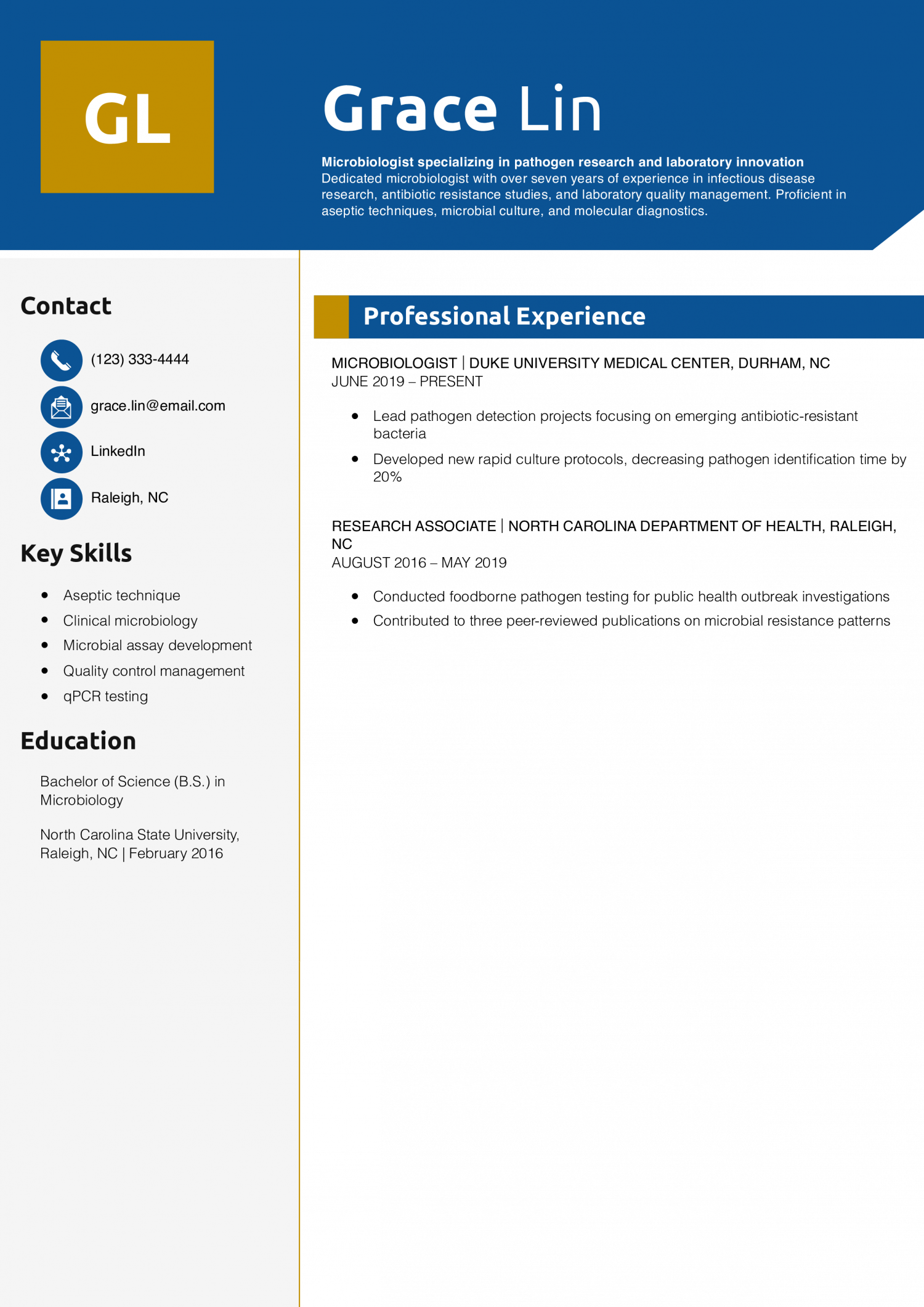
Why this microbiologist resume example is strong:
Grace’s resume effectively connects lab techniques to impactful research results, highlighting her adaptability in clinical and public health environments.
Key Tip:
Always emphasize any faster testing methods or research publications. See more advice at How To Update Your Resume.
Pharmaceutical Scientist Resume Example
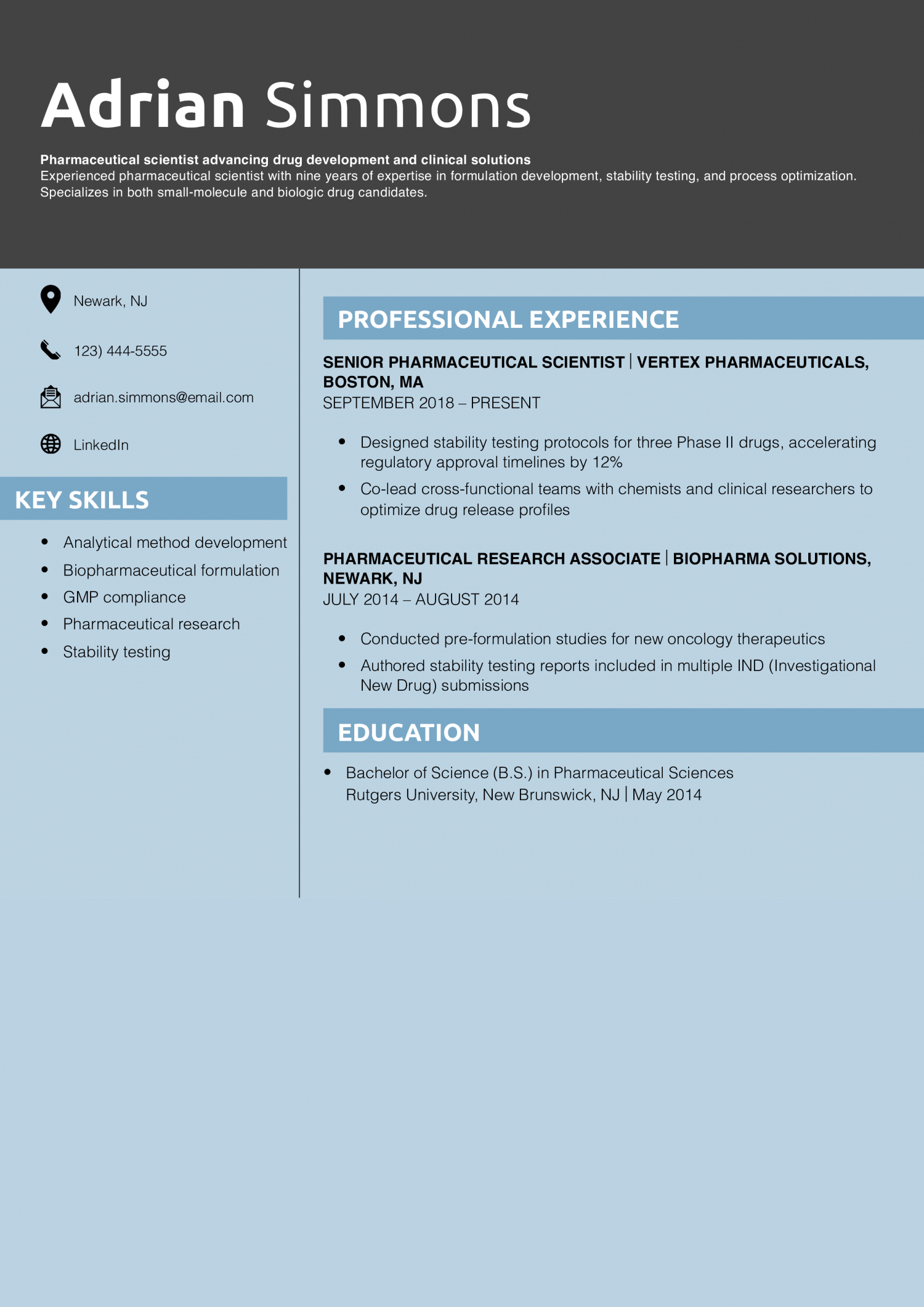
Why this pharmaceutical scientist resume example is strong:
Adrian’s resume highlights key milestones such as drug stability improvements and regulatory achievements, positioning him as a strong research and development (R&D) professional.
Key Tip:
Focus on drug development stages and regulatory contributions clearly. Find more resume insights at Job Title Examples for Your Resume.
Zoologist Resume Example
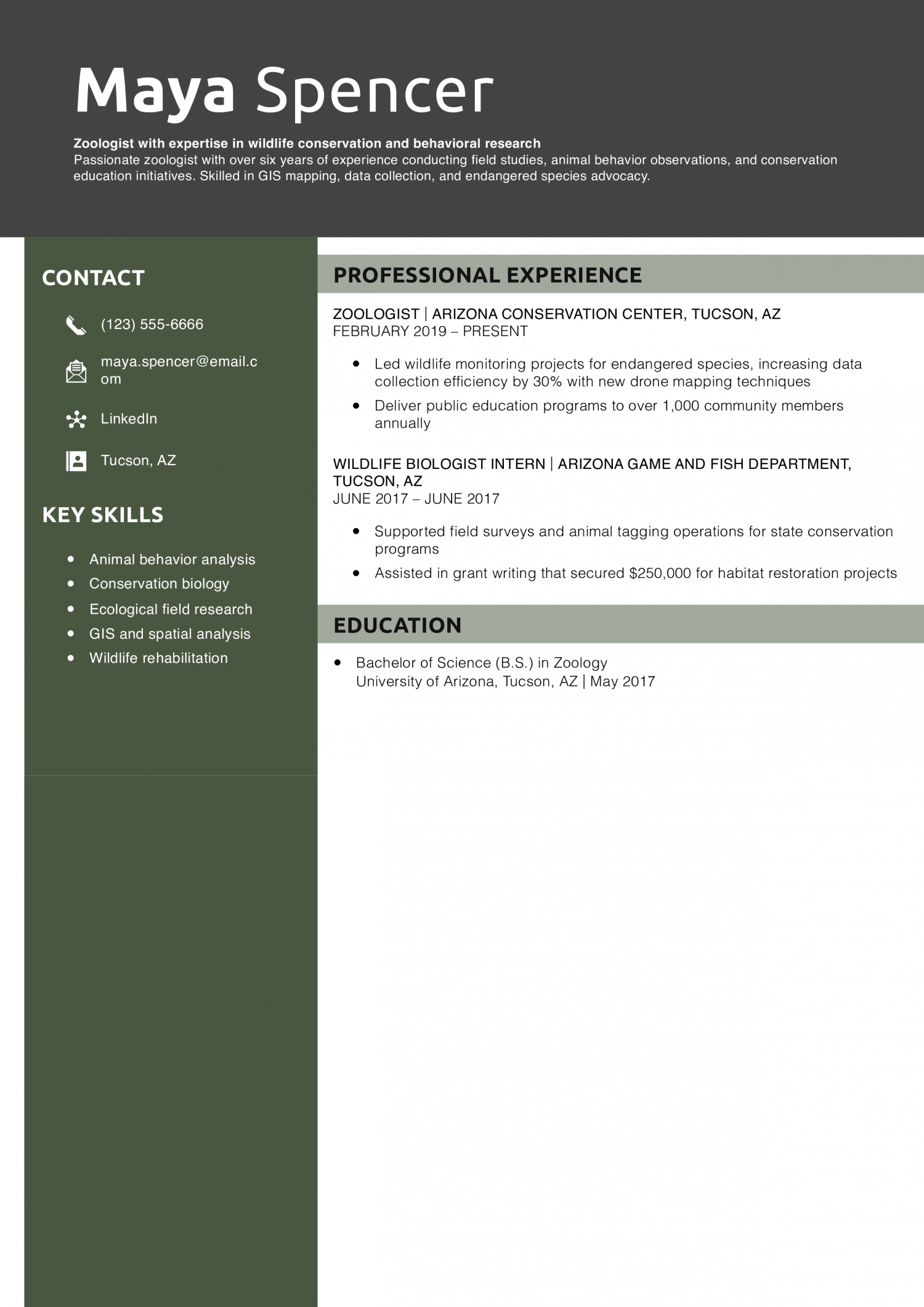
Why this zoologist resume example is strong:
Maya’s resume demonstrates field expertise, public engagement, and technical skills like GIS, offering a well-rounded conservation profile.
Key Tip:
Highlight any conservation education or public outreach experience, as it strengthens your profile.
Ecologist Resume Example
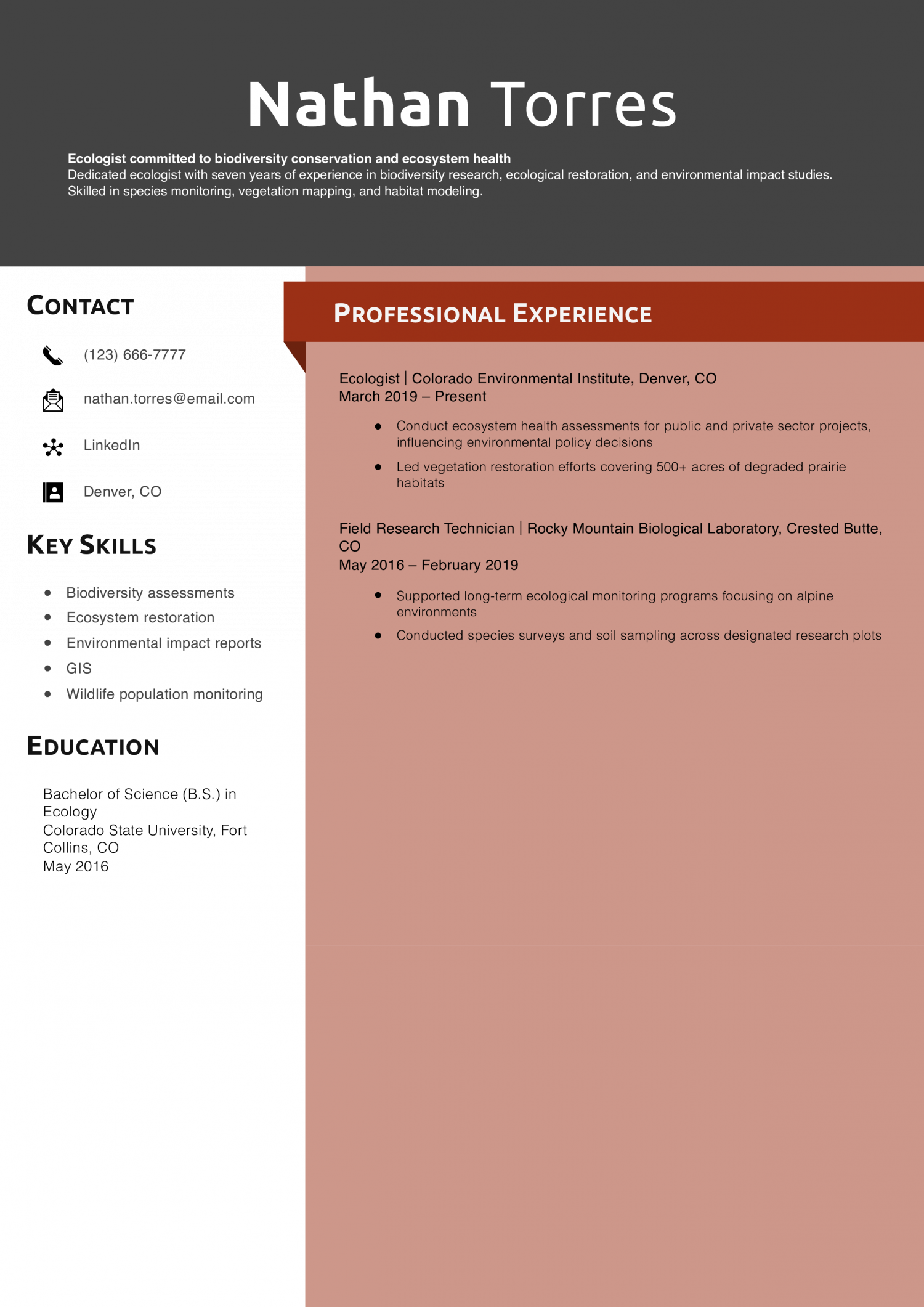
Why this ecologist resume example is strong:
Nathan’s resume highlights large-scale conservation impact and field-based expertise, key for environmental science roles.
Key Tip:
Focus on scale and scope of projects when describing ecological work. Learn how to structure this well at CV Vs. Resume: What Is the Difference?
Geneticist Resume Example
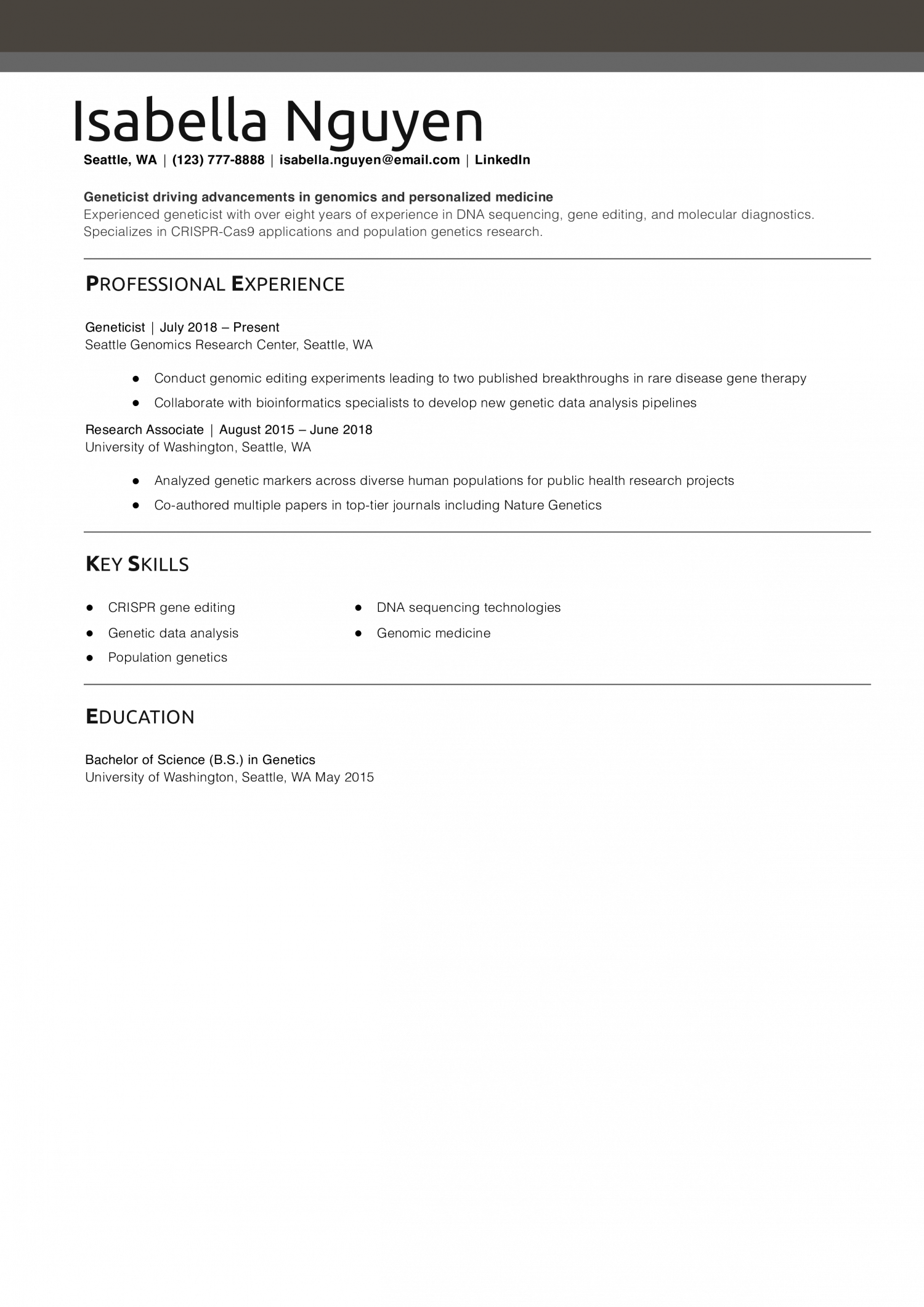
Why this geneticist resume example is strong:
Isabella’s resume ties advanced lab techniques to real-world research outcomes, essential for careers in genetics and biomedical research.
Key Tip:
Highlight lab methodologies and data interpretation skills clearly.
Astrophysicist Resume Example
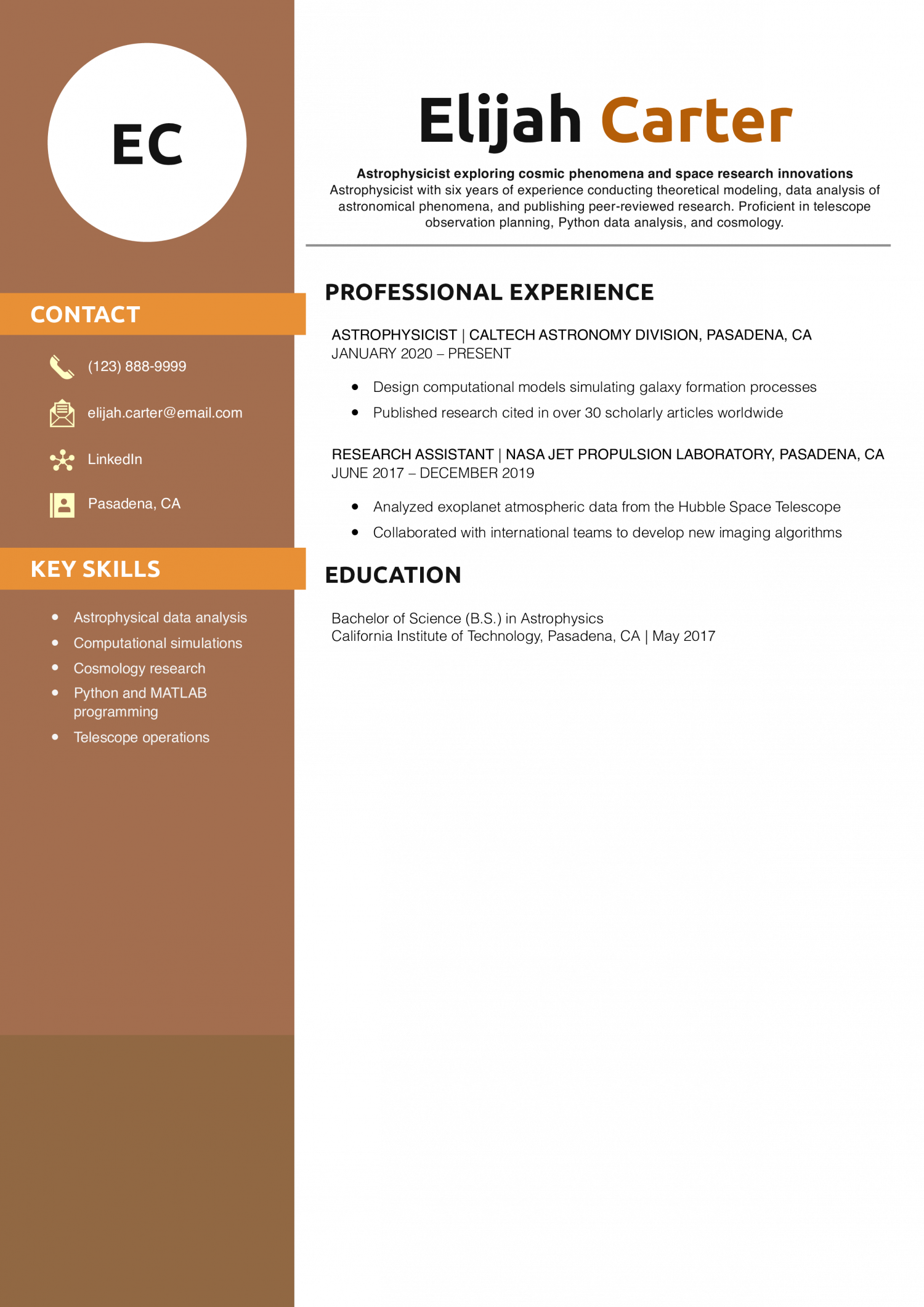
Why this astrophysicist resume example is strong:
Elijah’s resume demonstrates a clear connection between theoretical research and practical analysis, supported by strong publication metrics.
Key Tip:
Quantify the impact of your research whenever possible. Learn more about impactful resume strategies at Career Advice: Job Titles for Resume.
Toxicologist Resume Example
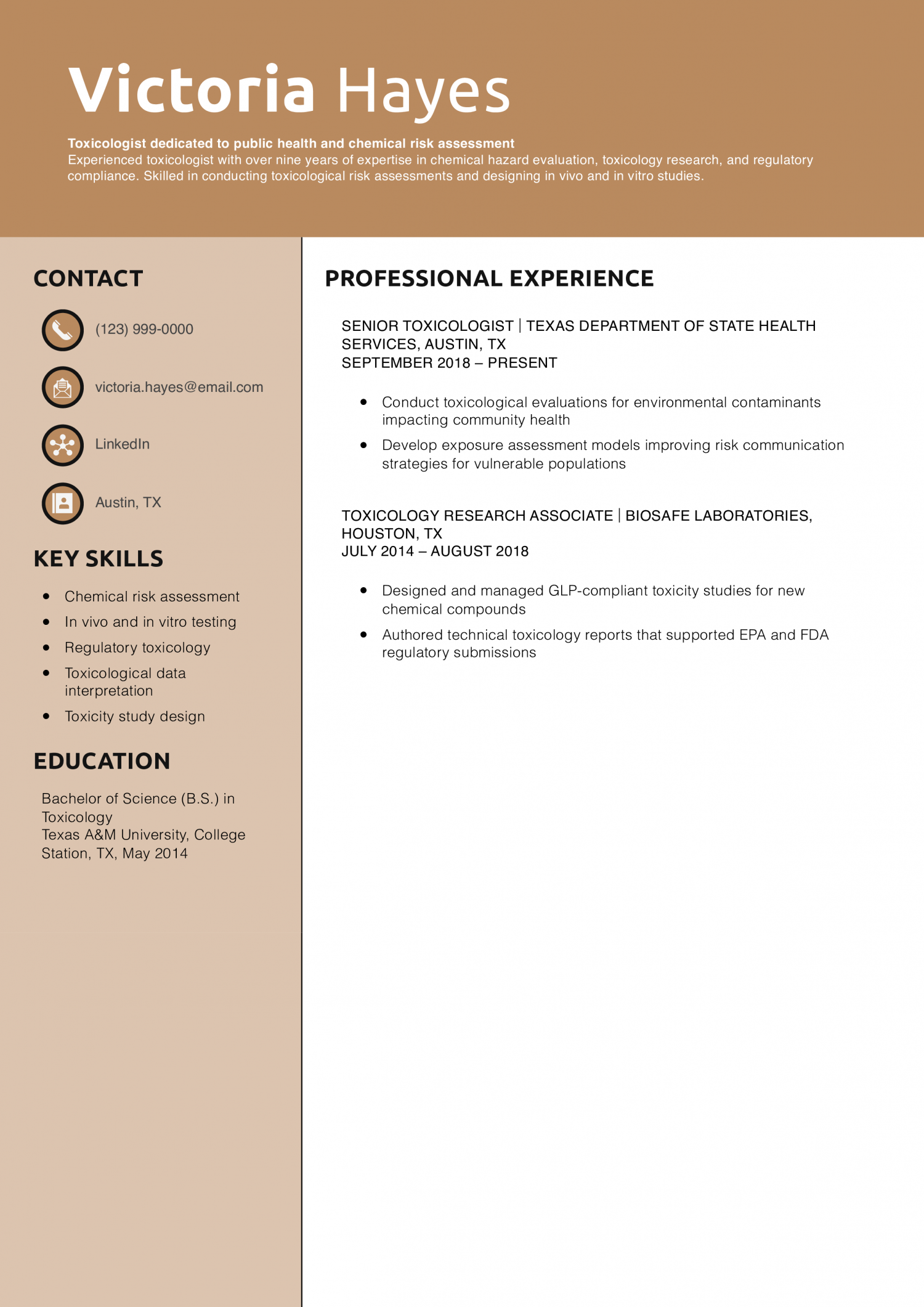
Why this toxicologist resume example is strong:
Victoria’s resume emphasizes direct public health impacts, regulatory experience, and leadership in designing toxicology studies.
Key Tip:
In regulated fields, clearly link your work to compliance and public impact. Learn more at How To List Volunteer Work Experience on a Resume.
Botanist Resume Example
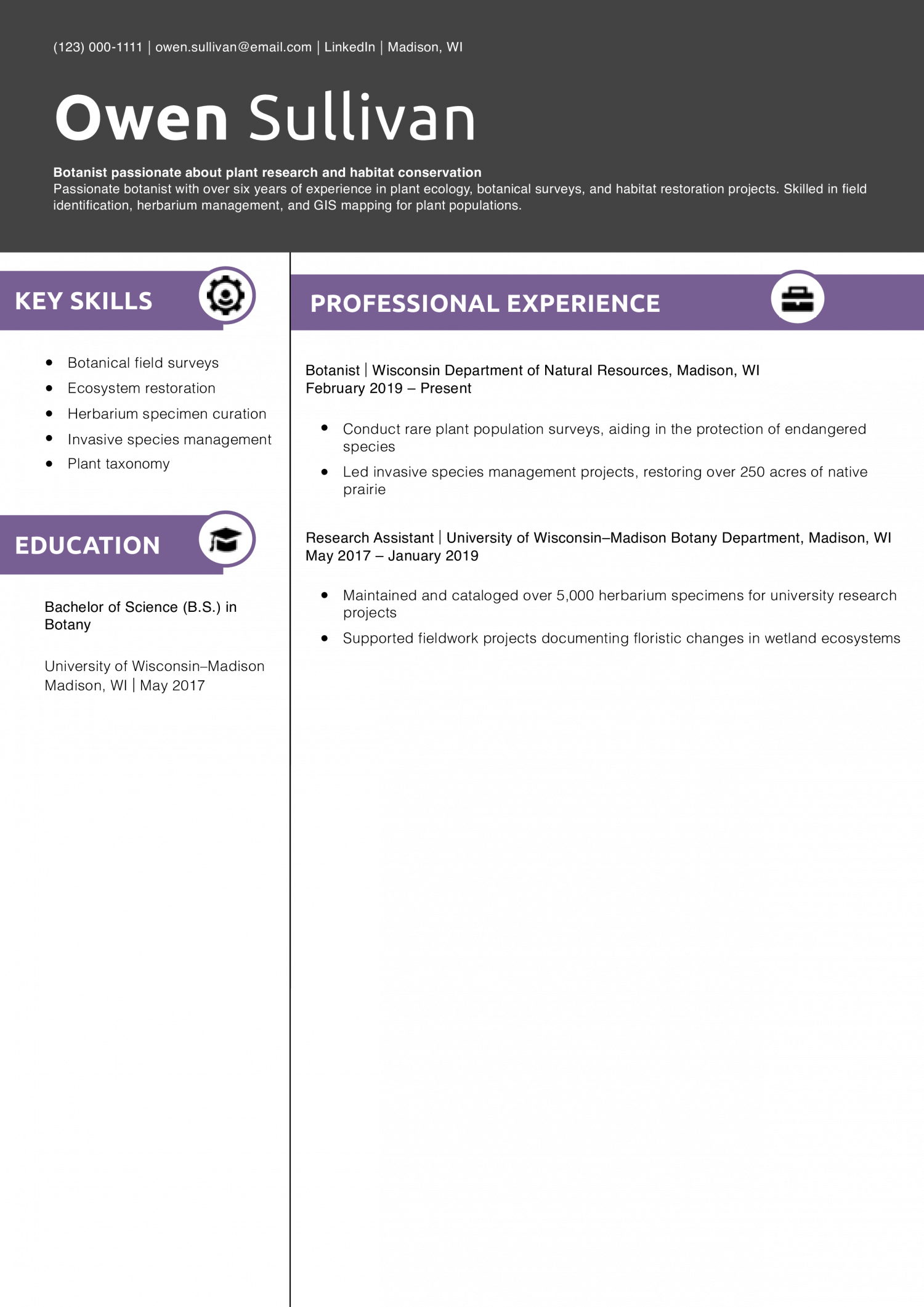
Why this botanist resume example is strong:
Owen’s resume shows direct contributions to conservation projects and academic research, balancing field expertise with scientific documentation.
Key Tip:
In environmental sciences, hands-on project work can be even more impressive than titles. Learn how to highlight it at How To Write Your First Job Resume.
Science Text-Only Resume Templates and Examples
How To Write a Science Resume
A template can help you organize your career information for an effective science resume. Your resume should usually have these sections:
- Contact information
- Profile
- Key skills
- Professional experience
- Education and certifications
Depending on your science background and job search, you may also include one or more of these sections:
- Academic projects
- Affiliations
- Fellowships
- Patents
- Publications
- Research
Before starting work on your resume, jot down your preferences for your target job duties, industry, employer size, or work culture. These notes will help you determine and emphasize your best career details as you develop each section.
1. Share your contact information
Give your full name, phone number, email address, location, and links to any online professional profiles. When applying to jobs, always double-check your contact info for accuracy – it’s as important as anything else on your resume.
Example:
Your Name
[email protected] | (123) 456-7890 | City, ST | LinkedIn
2. Craft an outstanding profile with a summary of your science qualifications
Impress hiring managers at the top of your resume by giving the three to five main reasons you can excel in your next science job. Consider what sets you apart from other candidates, such as your:
- Years of related work or research experience
- Main strengths or specialties
- Work style or approach (such as efficient, diligent, or collaborative)
- Advanced degree(s) or certifications in your field
(Note: Most job seekers find it easier to write their profile last.)
Senior-Level Profile Example
Environmental scientist with 12 years of field and lab experience specializing in climate data analysis, ecological restoration, and sustainability reporting. Proven record of managing research projects funded by government and academic institutions. Skilled at translating scientific data into actionable insights.
Entry-Level Profile Example
Biology graduate with strong academic training in molecular and cell biology, PCR testing, and laboratory safety protocols. Completed internship at a biomedical research lab and contributed to gene sequencing analysis. Eager to apply technical skills in a full-time lab assistant role.
3. Showcase your science experience
View the experience section as a chance to give examples of your work and success in roles similar to the one you’re pursuing. For each job in your recent work history, brainstorm your duties and achievements on a separate document or sheet of paper. Then, choose the most relevant details to feature as bullet points in this section.
Senior-Level Professional Experience Example
Senior Research Scientist, Evergreen Biotech, San Diego, CA | August 2015 to present
- Designed and executed over 75 in-vitro experiments on plant-based compounds for therapeutic applications
- Secured $500,000 in grant funding through proposal writing and collaboration with academic partners
- Led a team of four lab technicians, improving sample processing time by 35% through workflow optimization
- Published five peer-reviewed articles in journals such as Nature Plants and Journal of Biotechnology
Entry-Level Professional Experience Example
Lab Intern, GreenTech University Biology Lab, Eugene, OR | January 2023 to May 2023
- Helped prepare and sterilize materials for daily lab experiments
- Assisted in DNA extraction and electrophoresis for research on genetic resistance in wheat
- Maintained laboratory logs and helped organize data using Microsoft Excel and RStudio
Resume writer’s tip: Quantify your experience
When possible, cite relevant performance data and metrics to show the results you've achieved. Hard numbers put your work in context and give recruiters a better sense of your scope and impact.
Do
- “Reduced analysis time by 20% by automating sample processing workflows using Python and OpenCV”
Don't
- “Helped automate tasks in the lab”
Resume writer’s tip: Tailor your resume to each application
Before sending your resume, review it carefully against the science job posting. Delete any details that don’t speak to the requirements, and consider using that space for more information about your relevant experience. This process takes extra time. But it can shorten your overall job search by giving you an edge over the many applicants who send a more general, less convincing resume.
What if you have no work experience?
Focus on your other credentials. Omit the “Professional Experience” section, and instead fill the page with details on relevant skills you’ve gained or projects you’ve worked on as an intern, volunteer, or student.
Regardless of your background, know that resumes are flexible. They can and should take whatever shape and structure they need to present your qualifications, whether that means a lengthy work experience section or none.
4. Outline your education and science-related certifications
With the education and certifications sections, you can show you have a strong knowledge base in your field. Cite any credentials you’ve earned that speak to your abilities. Below are templates and examples to help you organize this information on your resume (note, years are optional).
Education Template:
[Degree Name], [School Name], [City, ST] | [Graduation Year]
[Relevant honors, coursework, or activities]
Example:
Bachelor of Science (B.S.) in Biochemistry, University of Wisconsin, Madison, WI | 2022
Certifications Template:
[Certification Name], [Awarding Organization] | [Completion Year]
[Description if the credential is lesser-known but relevant]
Example:
Good Laboratory Practice (GLP) Certification, Association of Clinical Research Professionals | 2023
5. Outline your most useful science skills and proficiencies
A skills section lets you quickly show how you can contribute and excel in your target position. It also helps your resume perform well on applicant tracking systems (ATS) employers use to screen candidates. Below, you’ll find some key terms and skills to consider for this section:
- Data gathering and analysis
- Ecology fieldwork
- Experimental design
- Laboratory information management systems (LIMS)
- Literature review
- Microscopy
- Molecular biology
- Report writing
- Sample preparation
- Scientific communication
- Scientific method
- Spectroscopy
- Technical documentation
- Toxicology
- Wet lab procedures
- Workflow optimization
Resume writer’s tip: Use common action verbs
Start each bullet point with a strong action verb. Dynamic verbs help you keep the hiring manager’s attention and tell a compelling story about your experience.
The following list can help you find a good mix of action verbs for your science resume:
- Collected
- Conducted
- Created
- Decreased
- Discovered
- Documented
- Enhanced
- Explored
- Formulated
- Found
- Generated
- Grew
- Improved
- Increased
- Introduced
- Investigated
- Isolated
- Lowered
- Managed
- Observed
- Obtained
- Peer-reviewed
- Prevented
- Published
- Pursued
- Ranked
- Reduced
- Researched
- Reviewed
- Streamlined
- Studied
- Systematized
- Tested
- Updated
- Won
- Wrote
How To Pick the Best Science Resume Template
The best resume templates are simple and easy to edit. Choose one that lets you quickly add, delete, flesh out, rearrange, and reorder sections. With a flexible design, you can tailor and optimize your resume for each science job application.
Frequently Asked Questions: Science Resume Examples and Advice
First, look closely at the job post text and note any repeated or emphasized words. Compare these phrases with the language in your resume, particularly the profile and key skills sections. Then, seek ways to align your resume language with the job posting while not copying phrases or misstating your background.
For example, if the organization seeks someone collaborative, call out that aspect of your experience in your profile. Or say the company has many non-English speaking customers. Cite your foreign language skills both in your profile and as a separate section farther down the document. With adjustments like these, you can make your resume more relevant to each opportunity.
The key difference between a Science CV and a Science resume example is the level of detail. A CV is typically more comprehensive, listing all relevant experience and achievements, whereas a resume example is more concise, focusing only on the most relevant information for a particular job. The CV can also include academic background and research work, while a resume is usually more focused on professional experience and key accomplishments.
The combination or hybrid format, which merges a functional resume's profile section with a chronological resume's experience section. Most modern resumes (including the ones on this page) follow the combination format because it gives hiring managers the clearest view of an applicant's strengths and work history.
Expert advice: include a cover letter with your resume
A good cover letter sharpens your job application by directly explaining why you’re interested in the organization or job opening. When possible, quote or paraphrase text from the job posting and explain why it caught your attention.
Check Out Related Examples
Resume Templates offers HR approved resume templates to help you create a professional resume in minutes. Choose from several template options and even pre-populate a resume from your profile.

